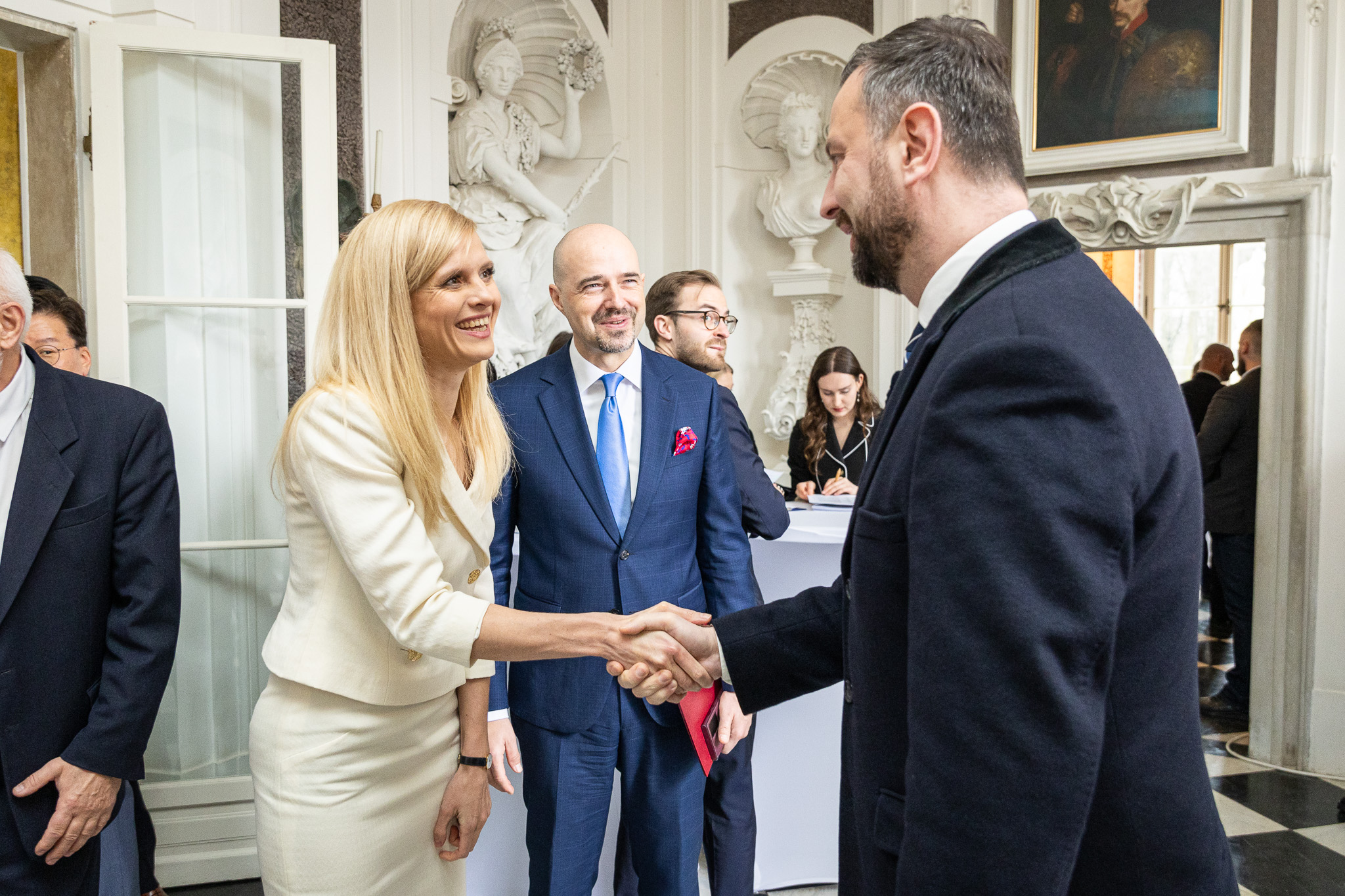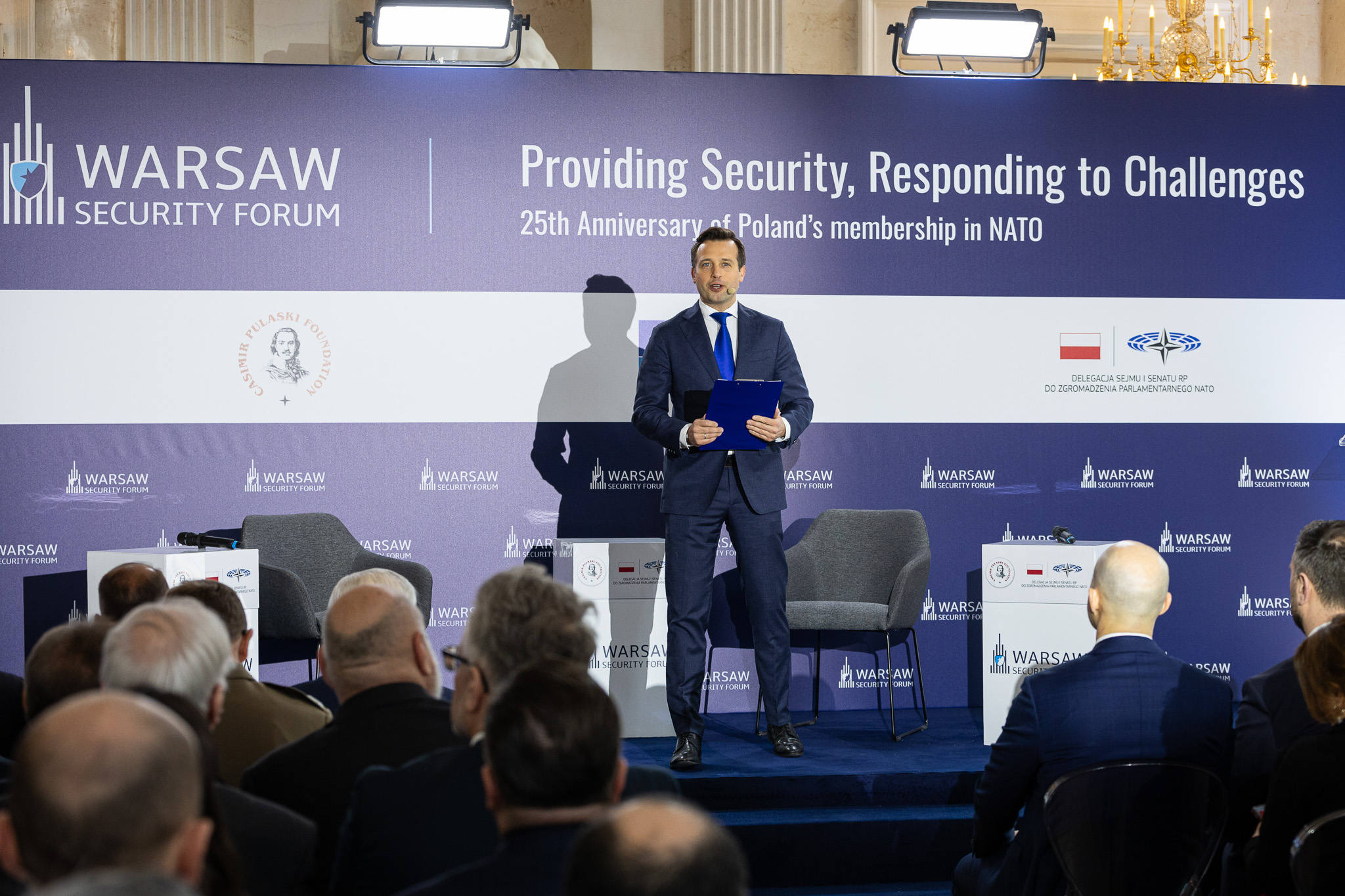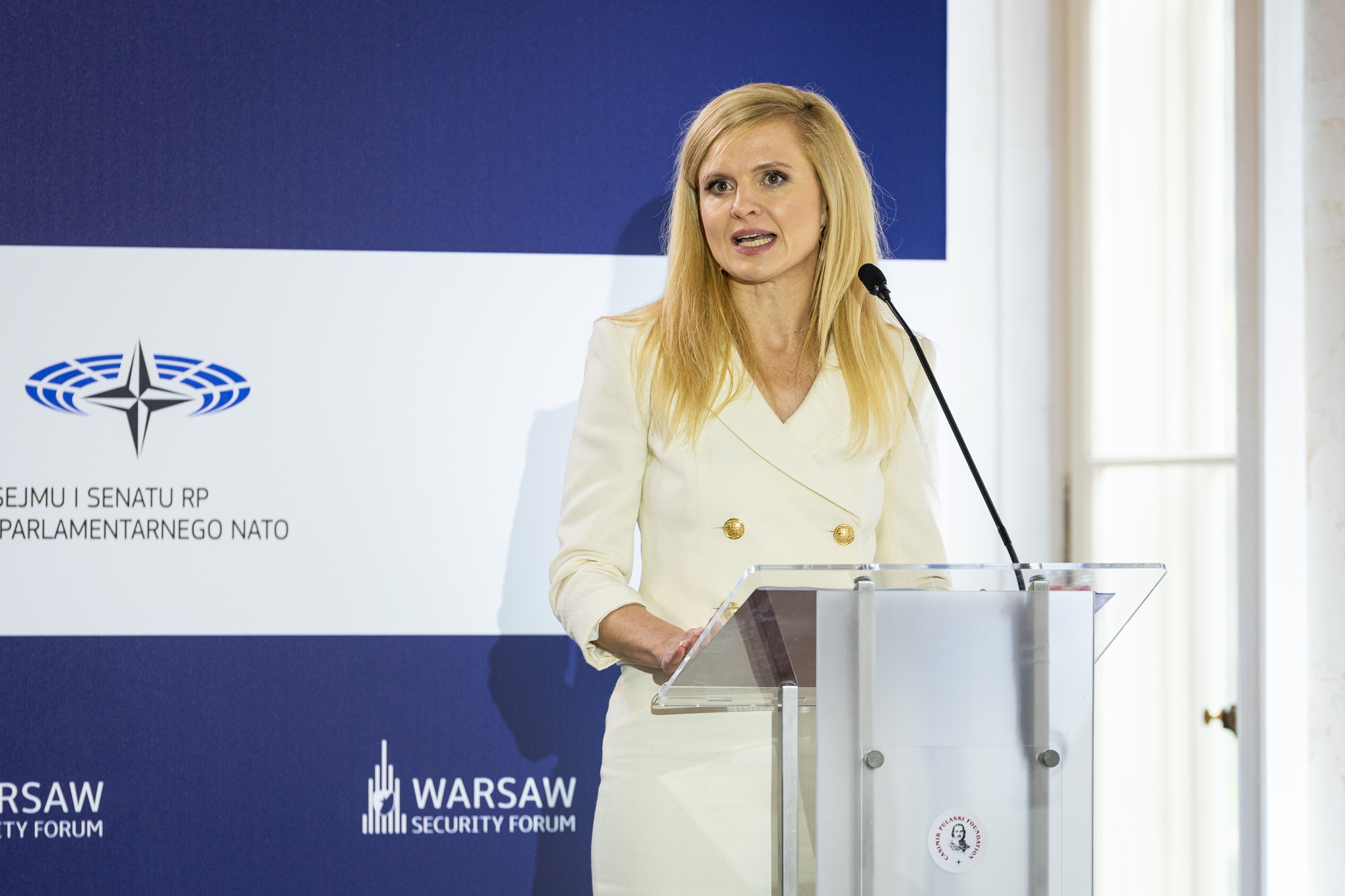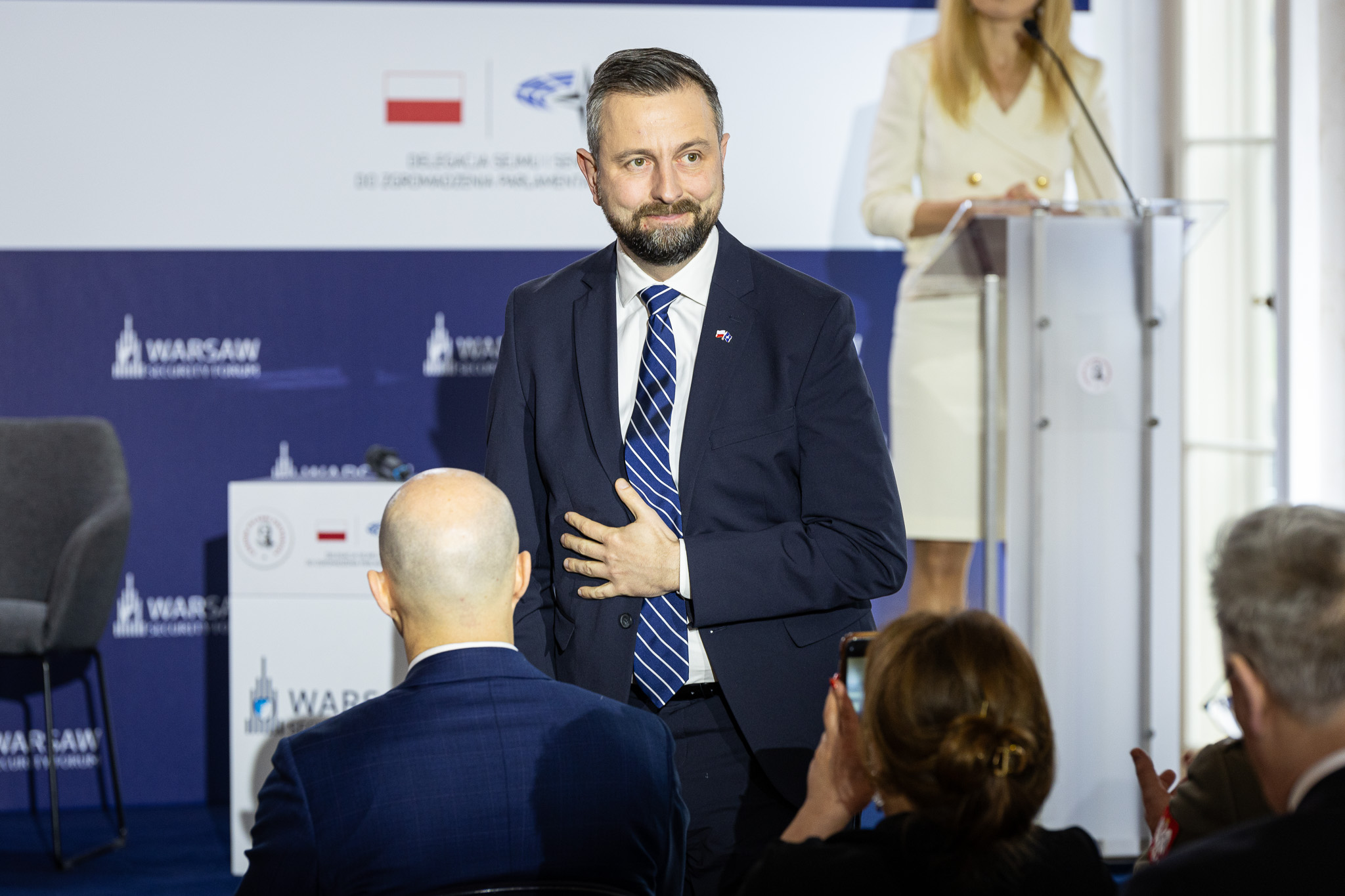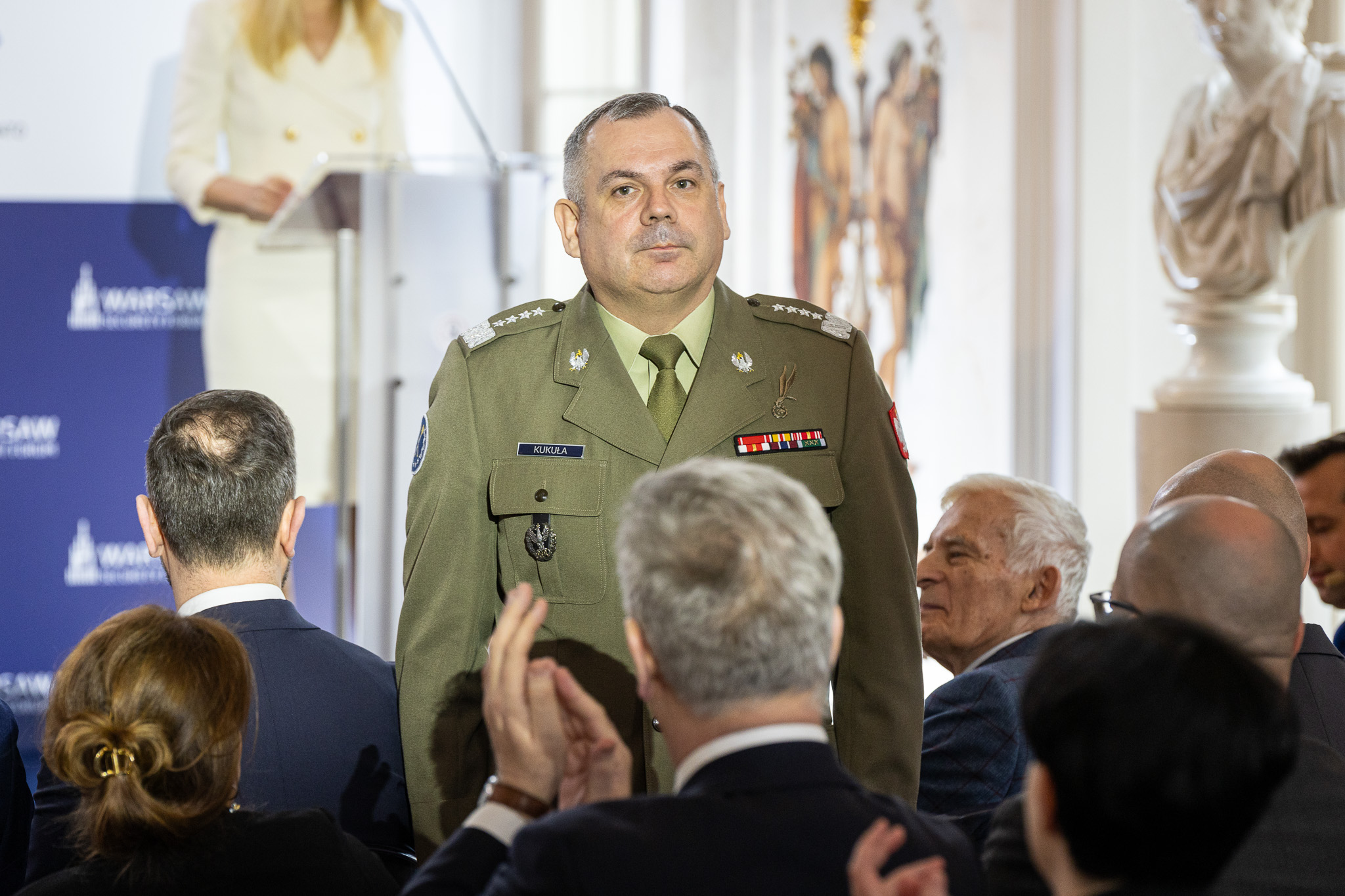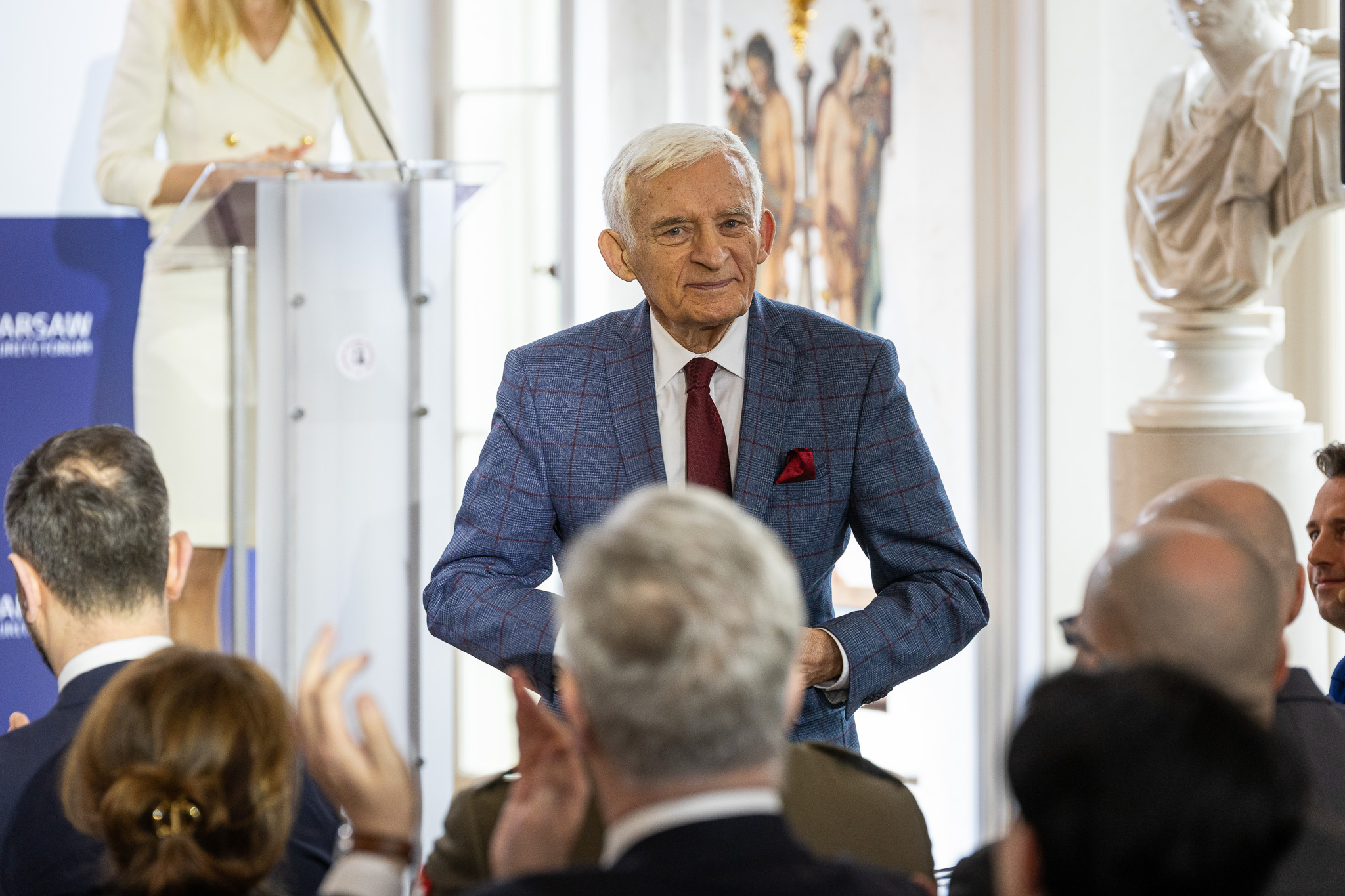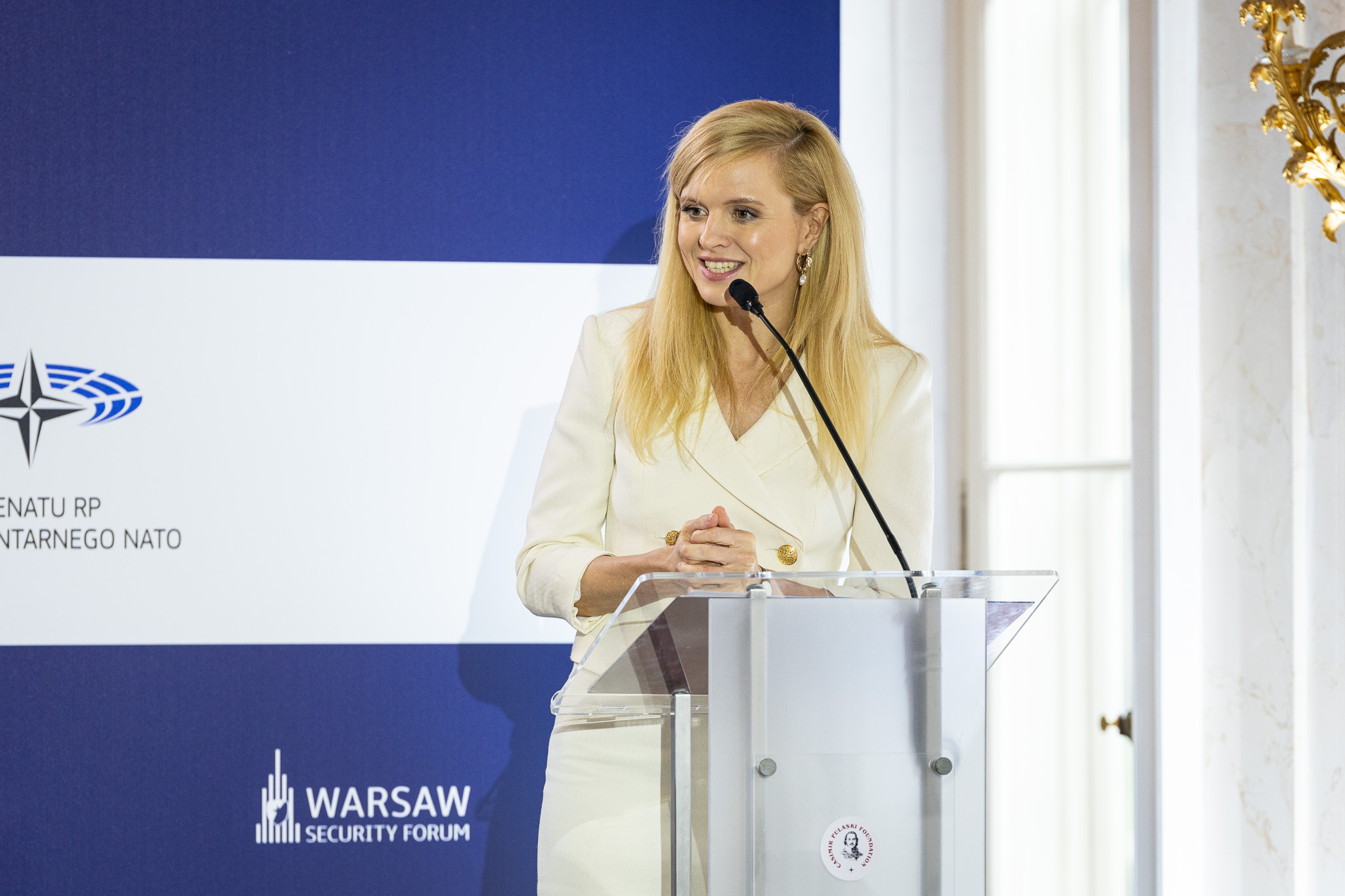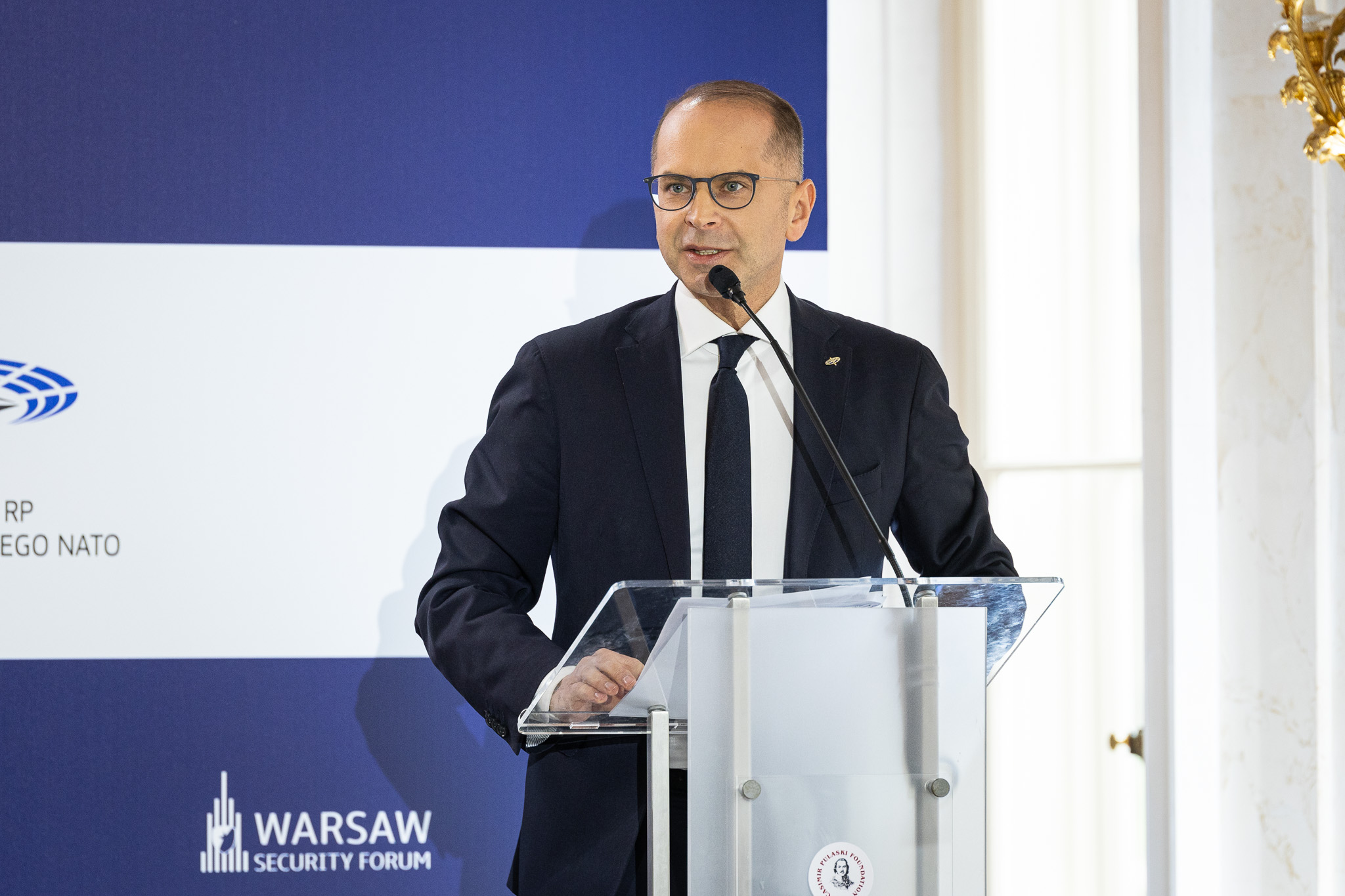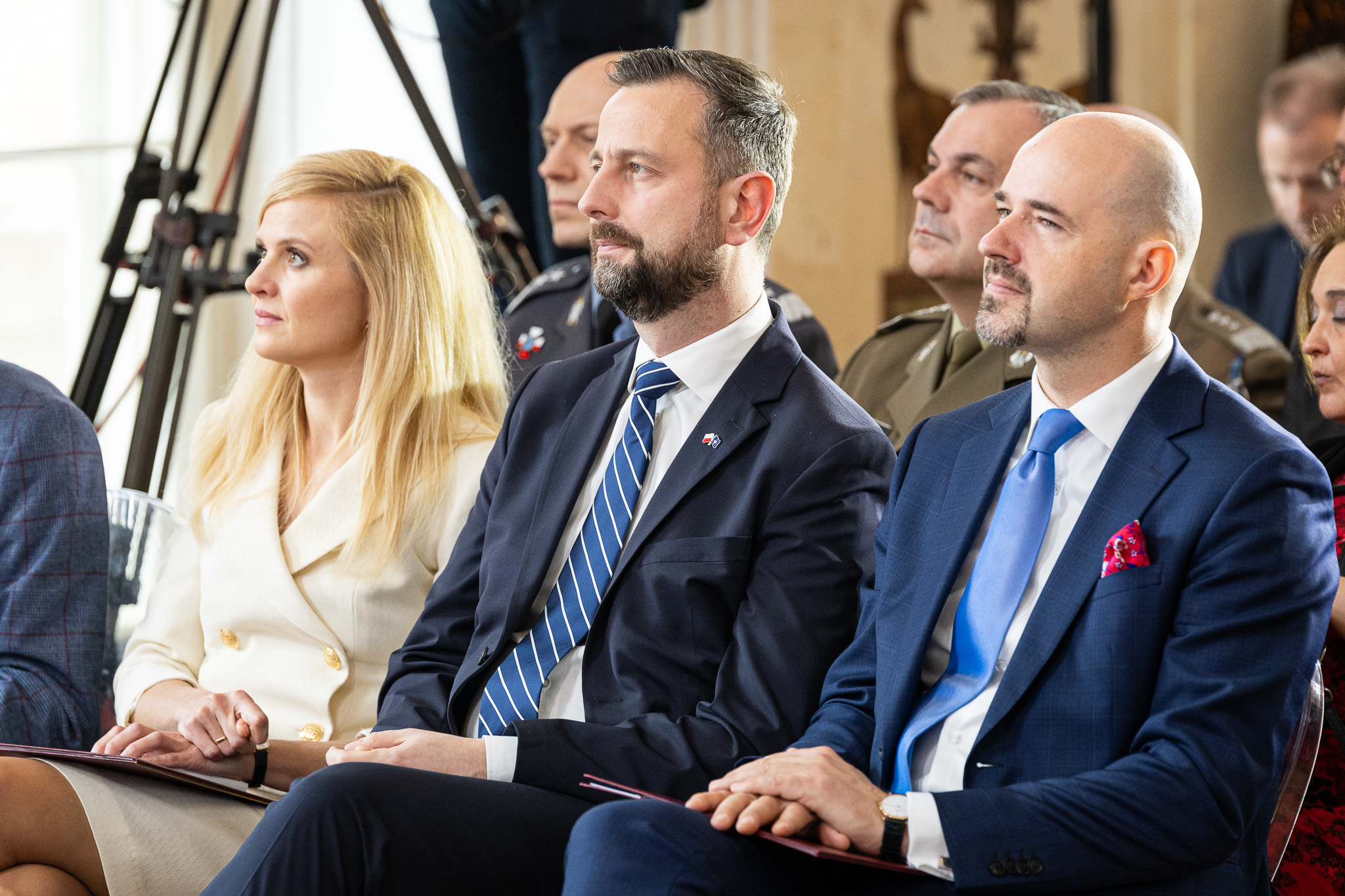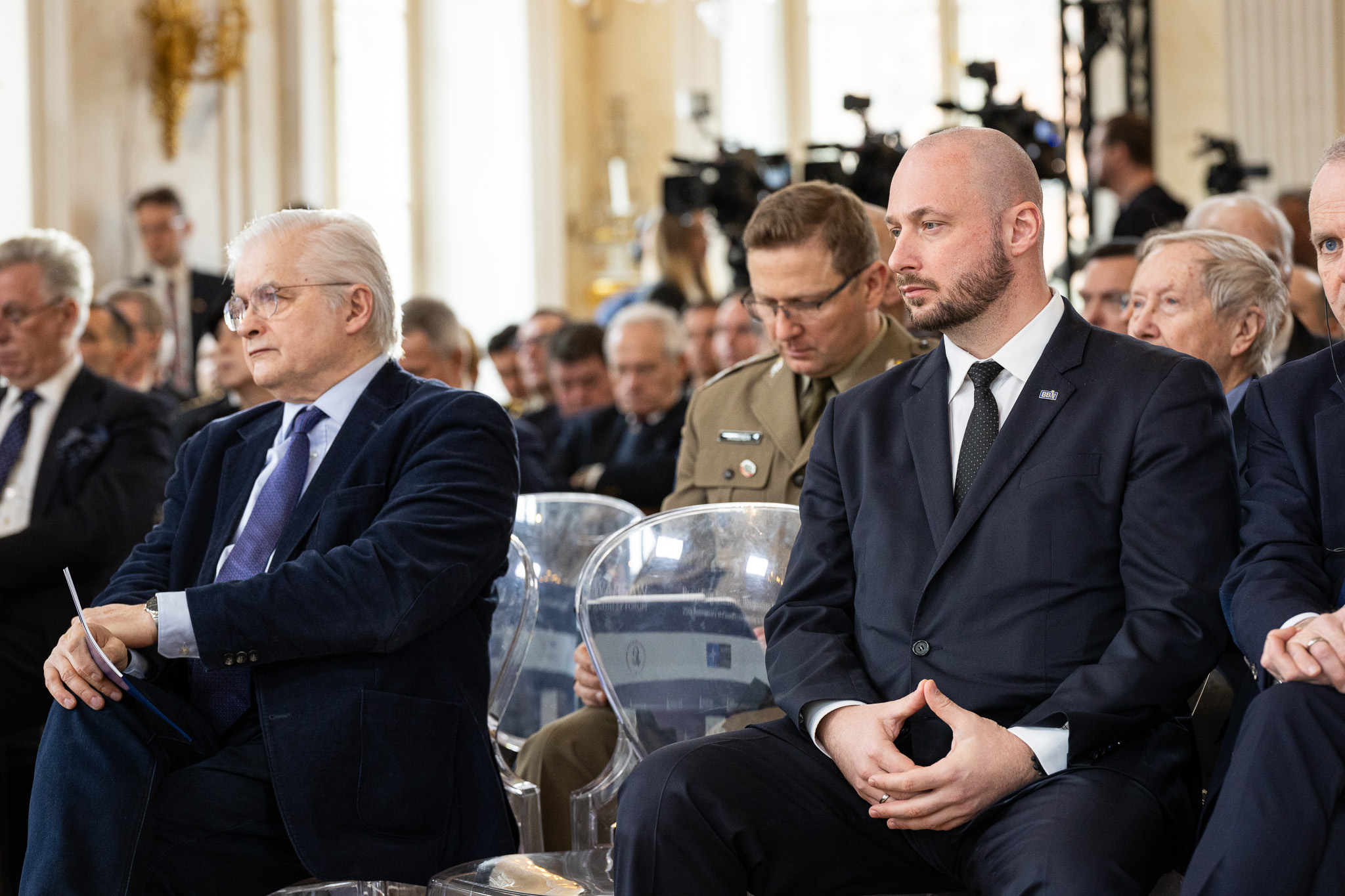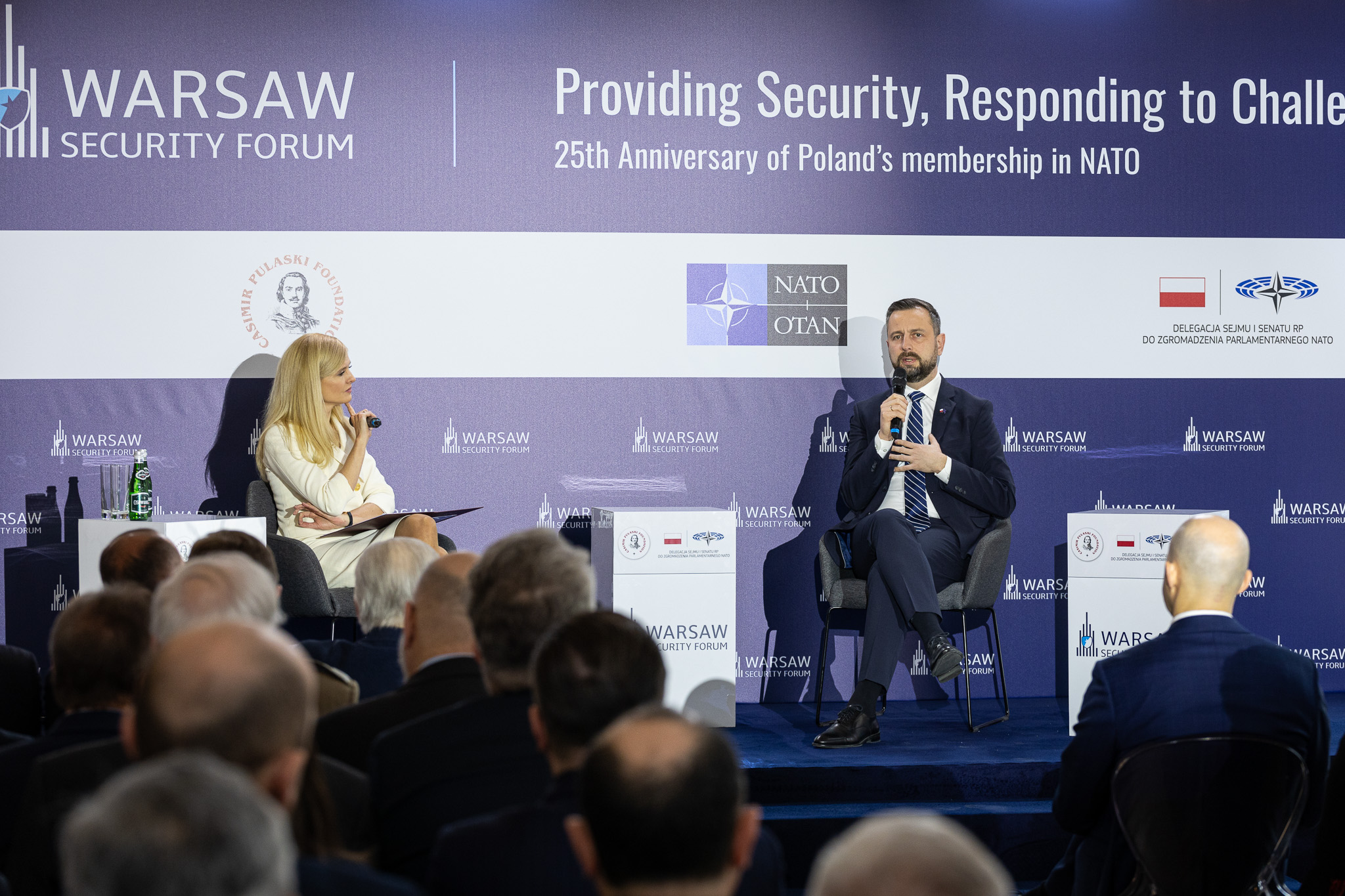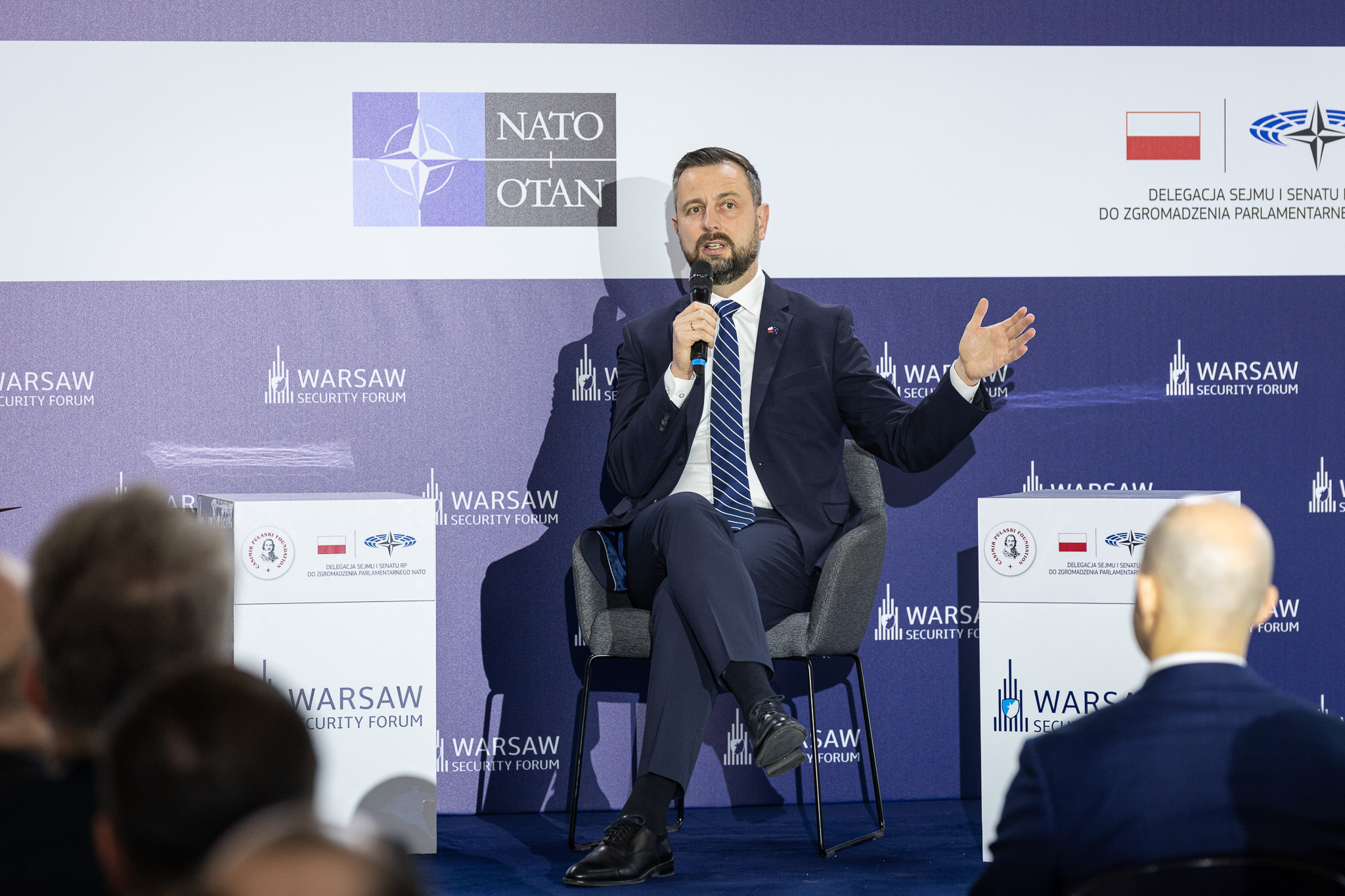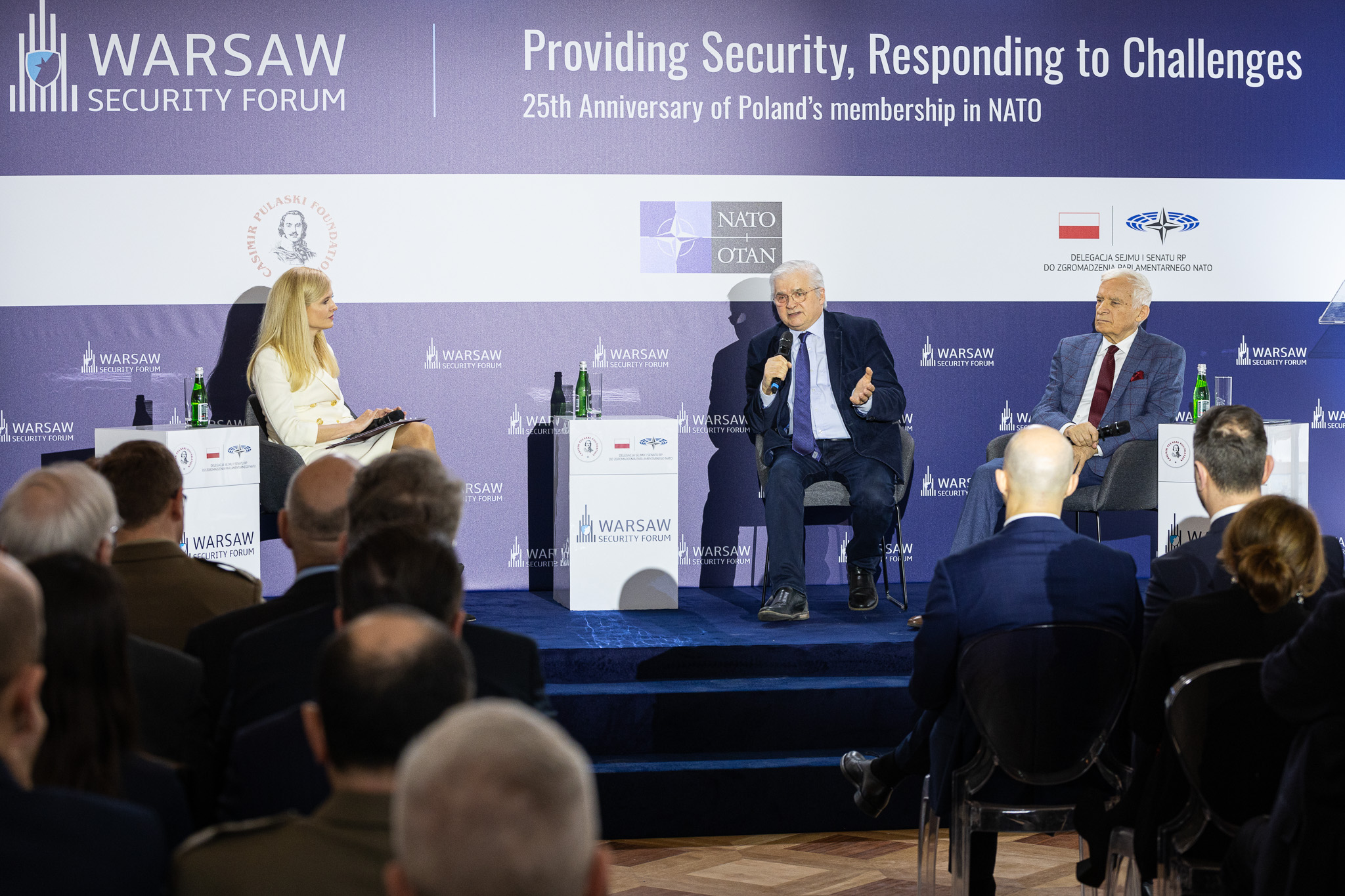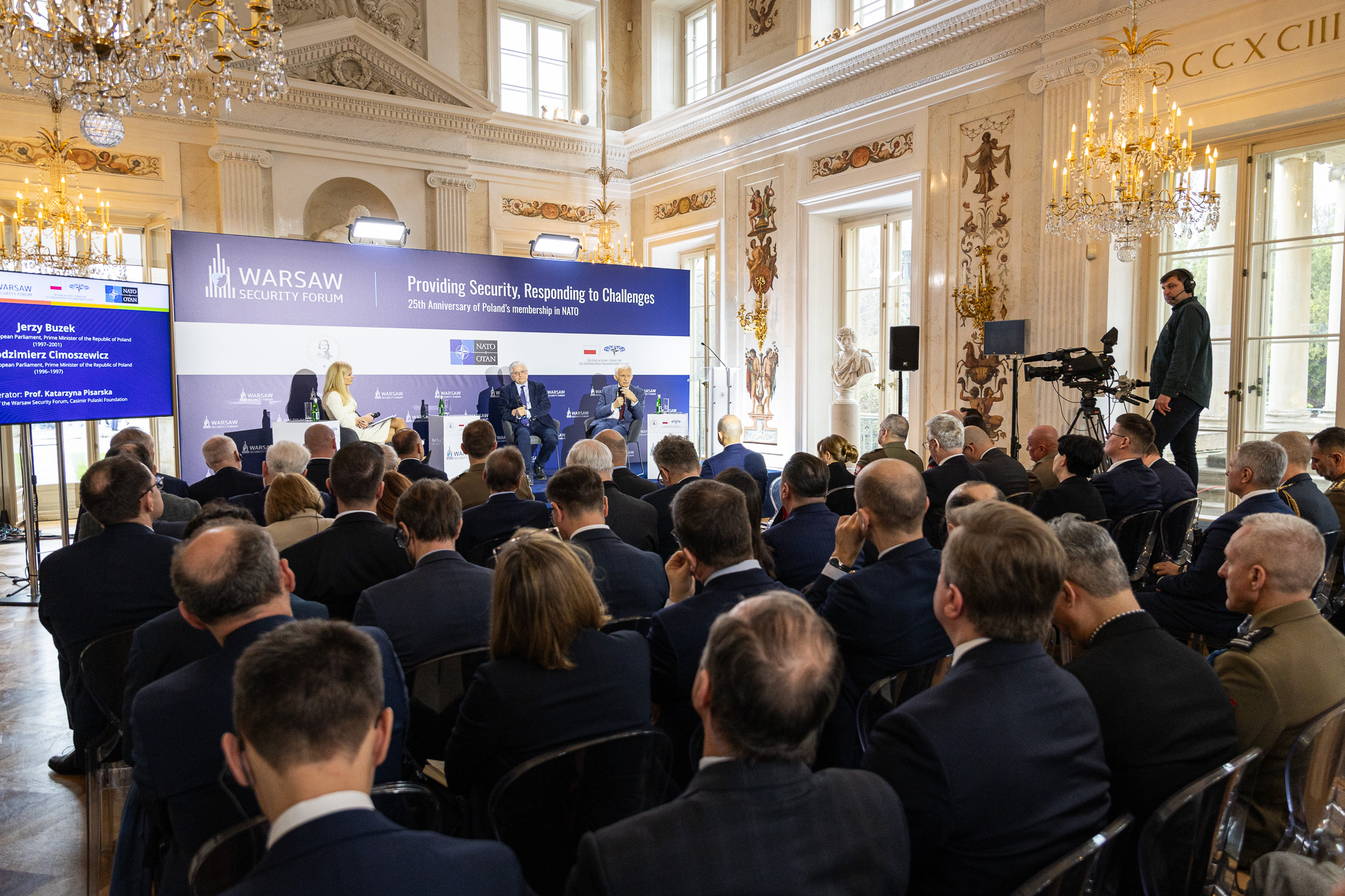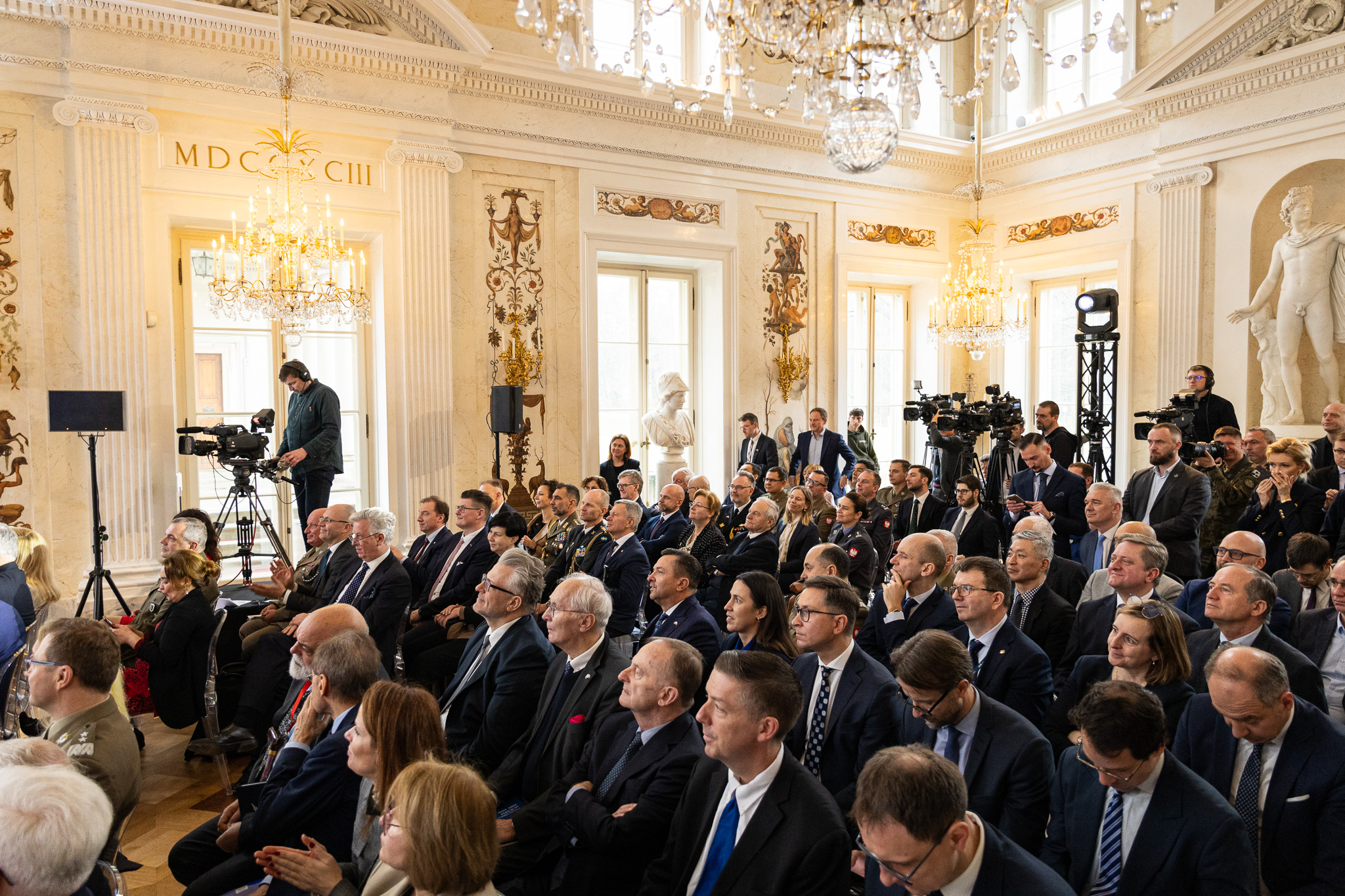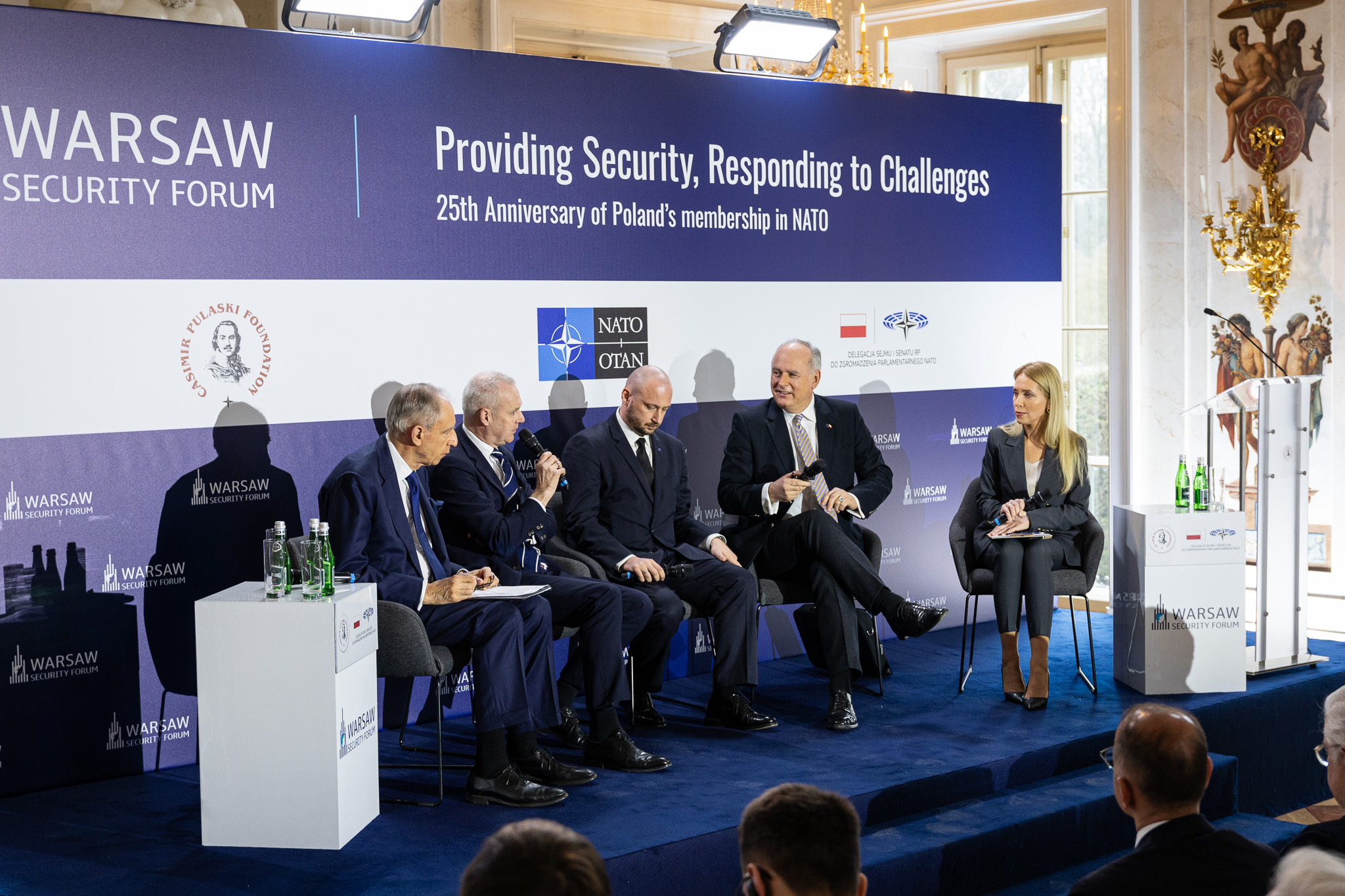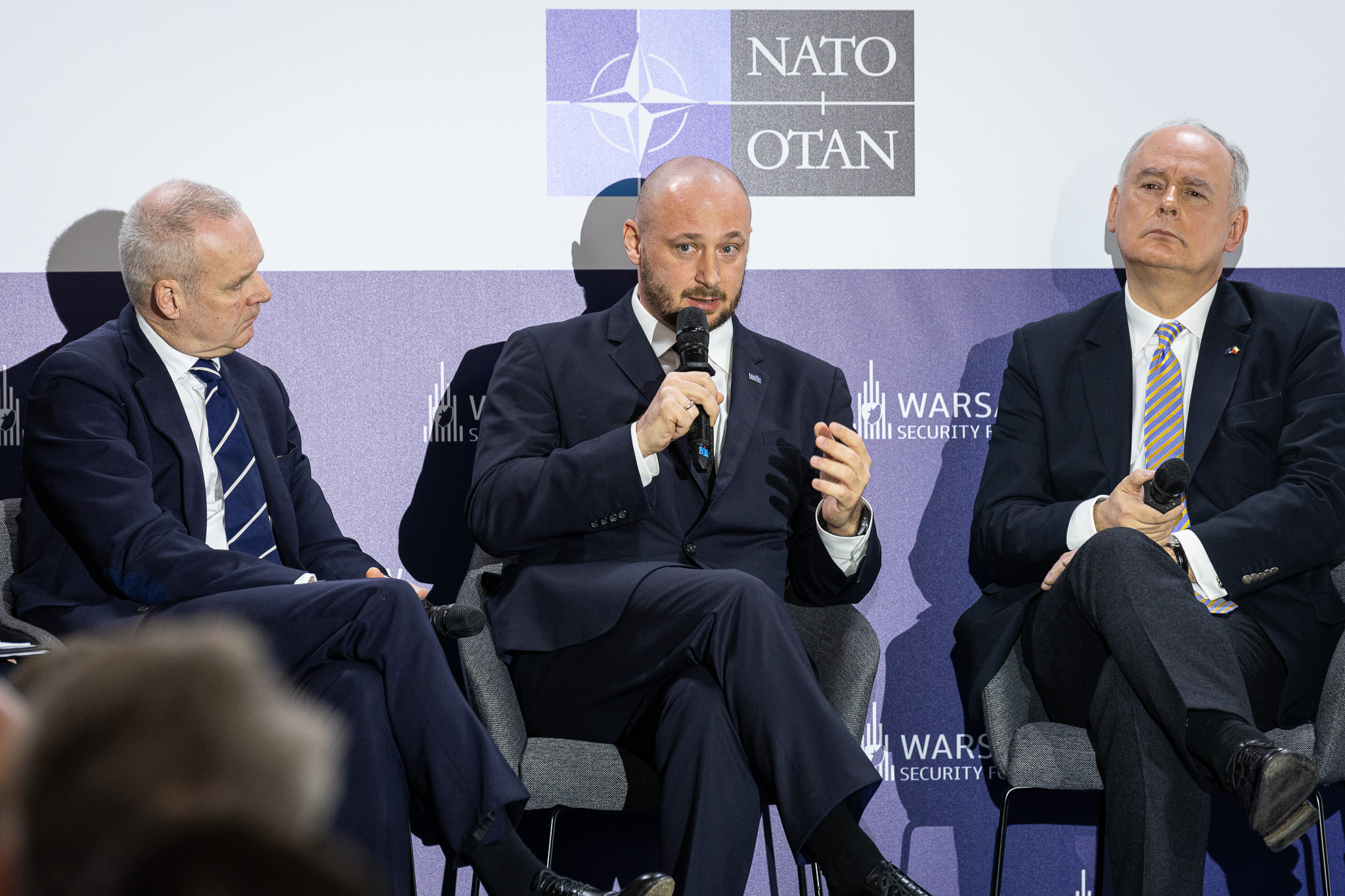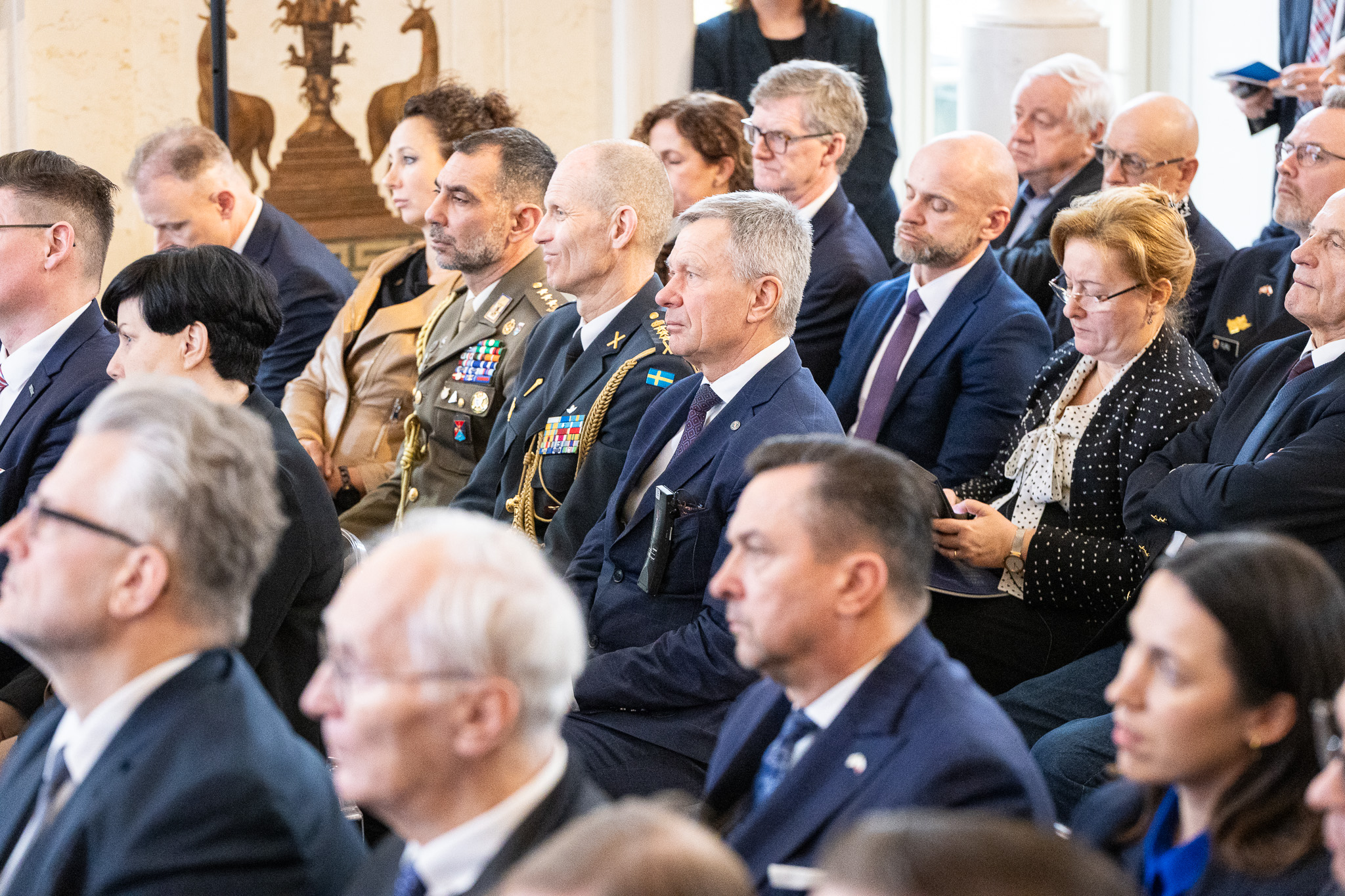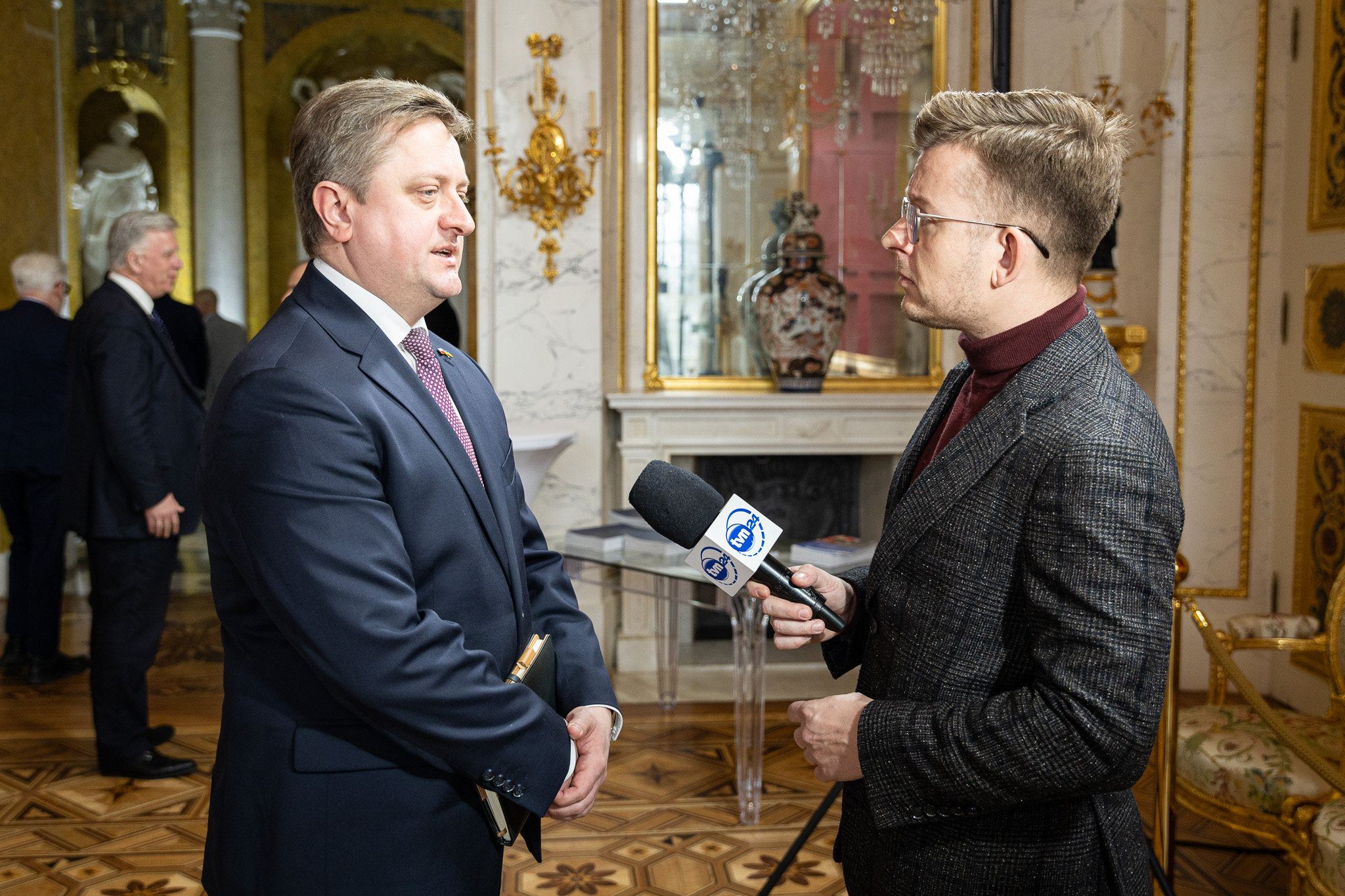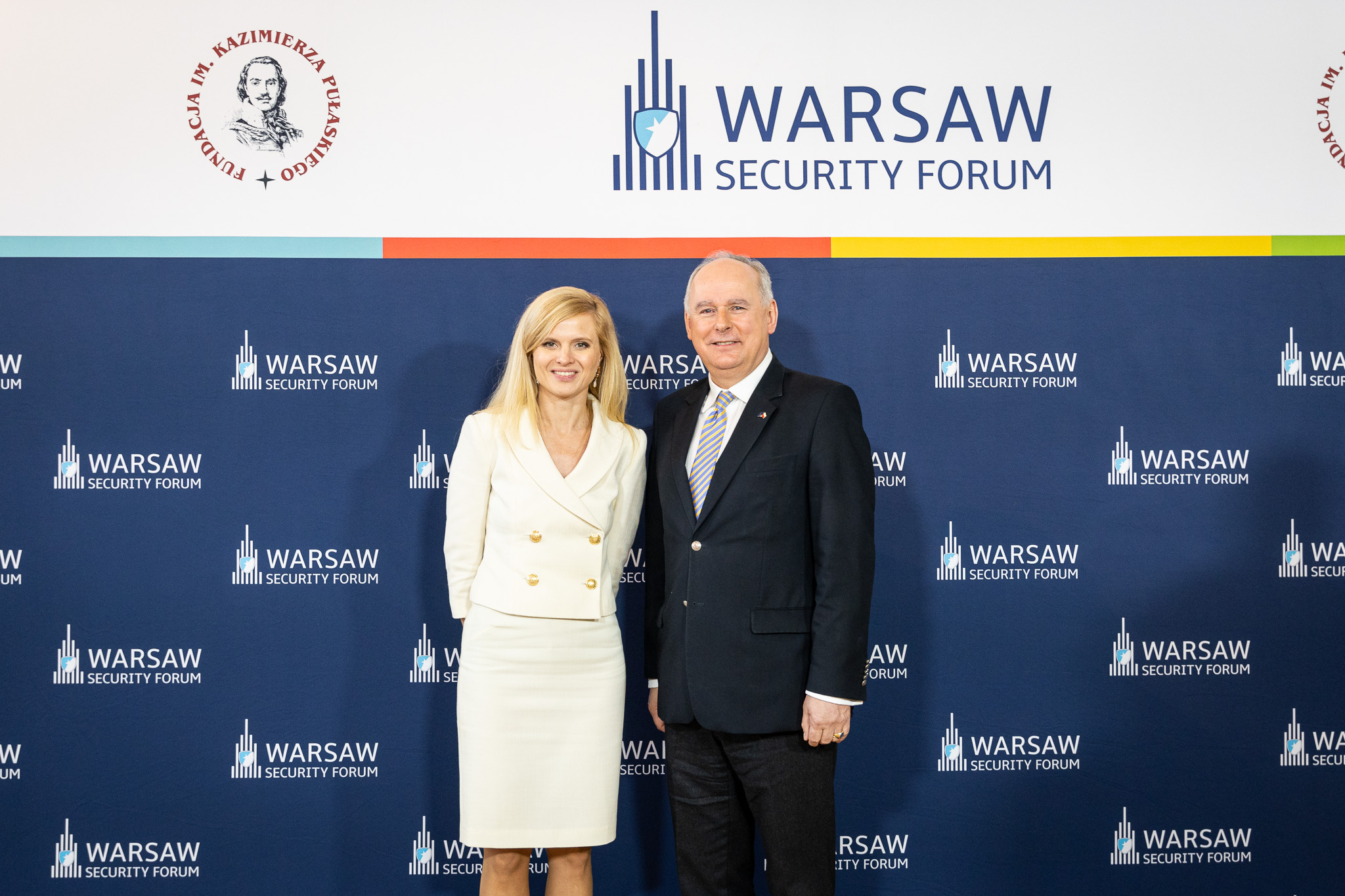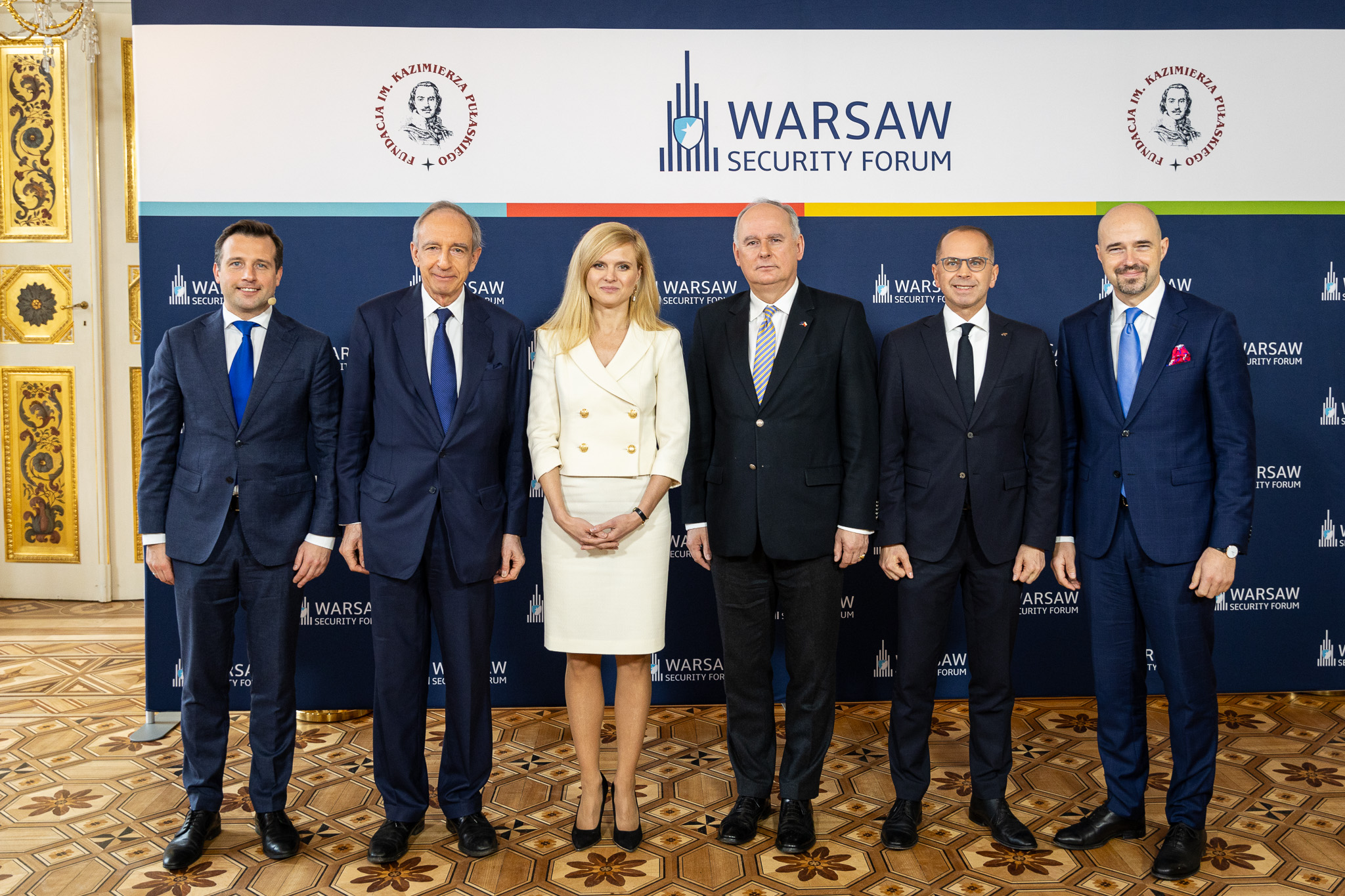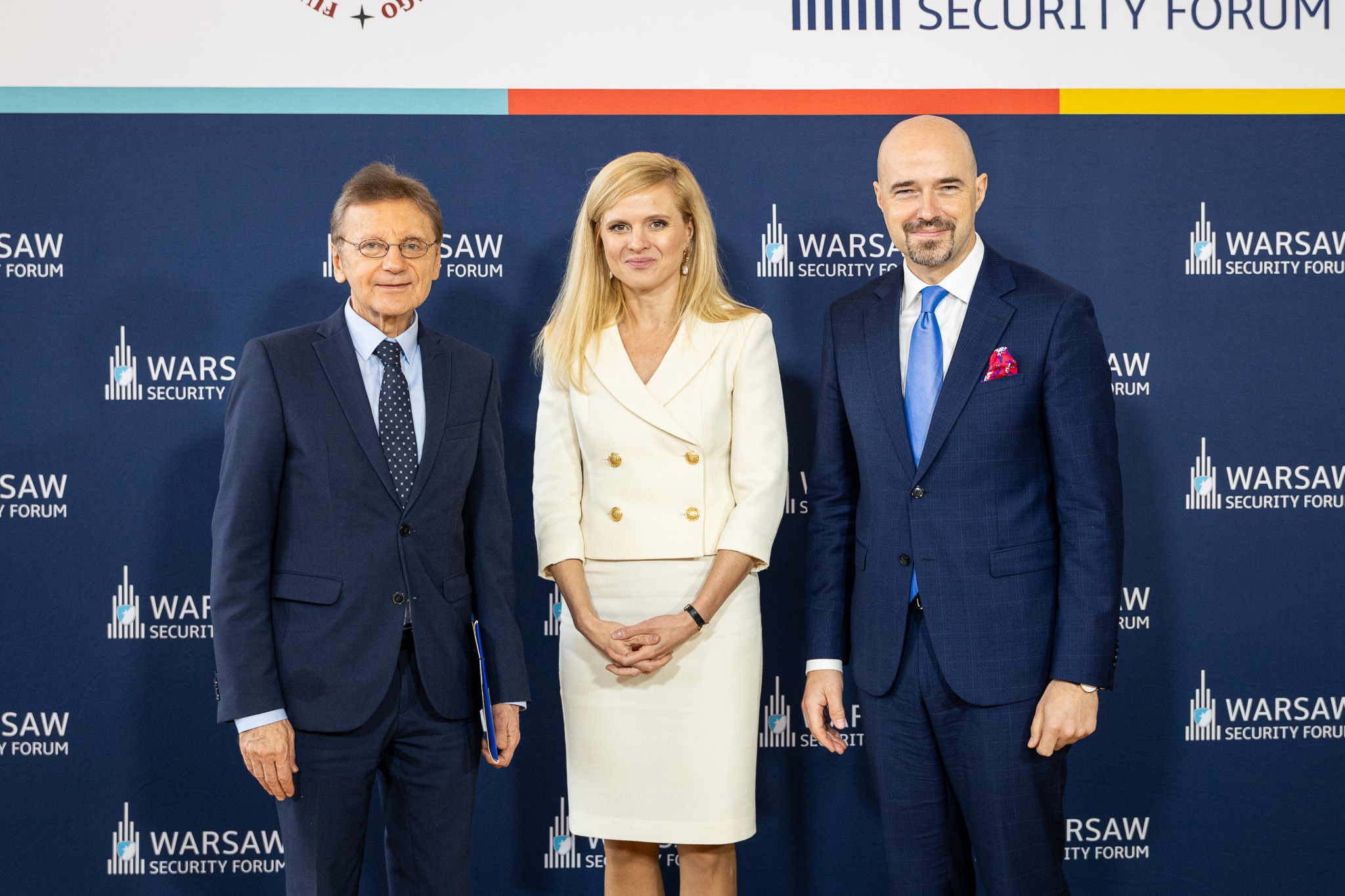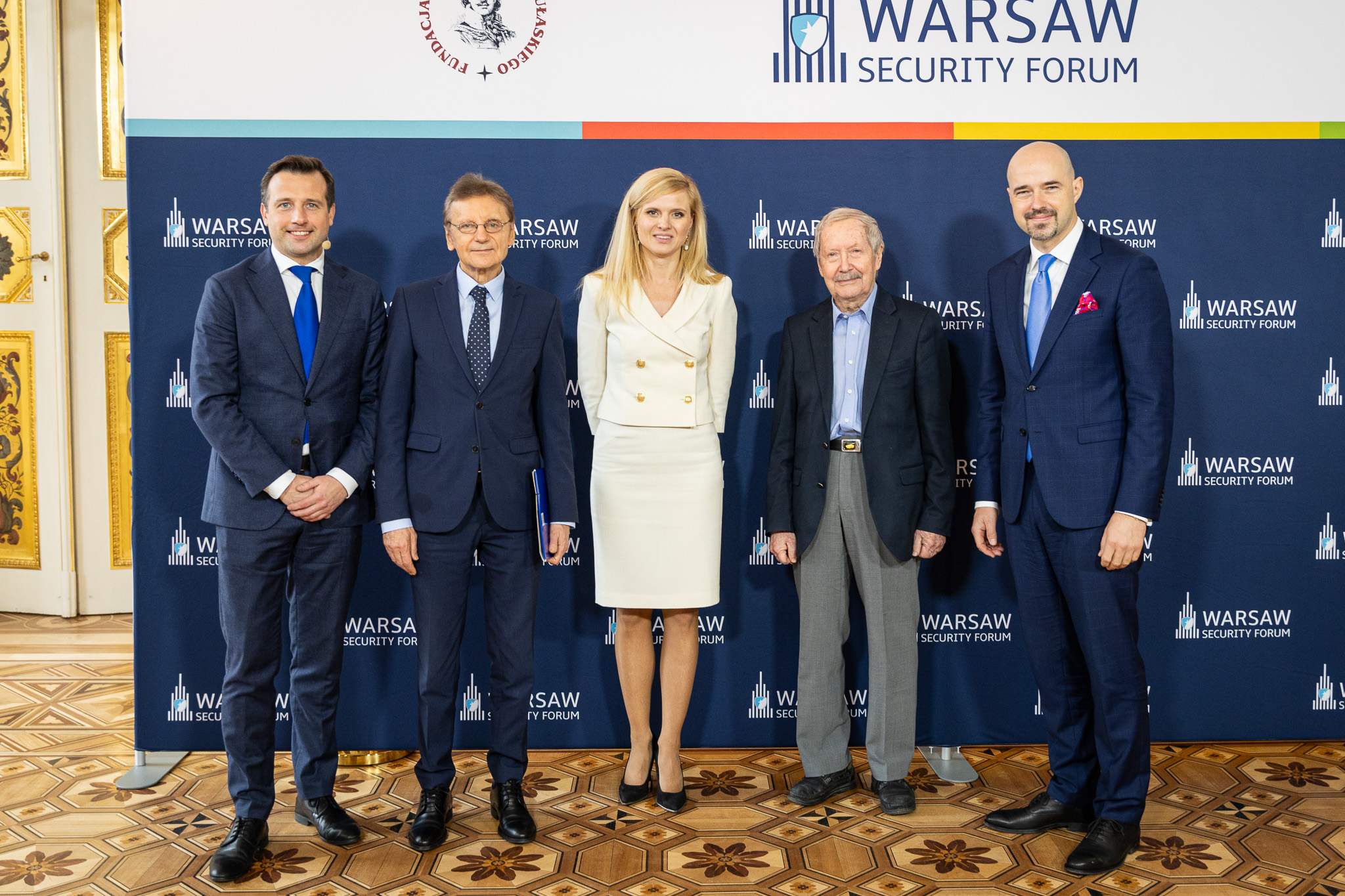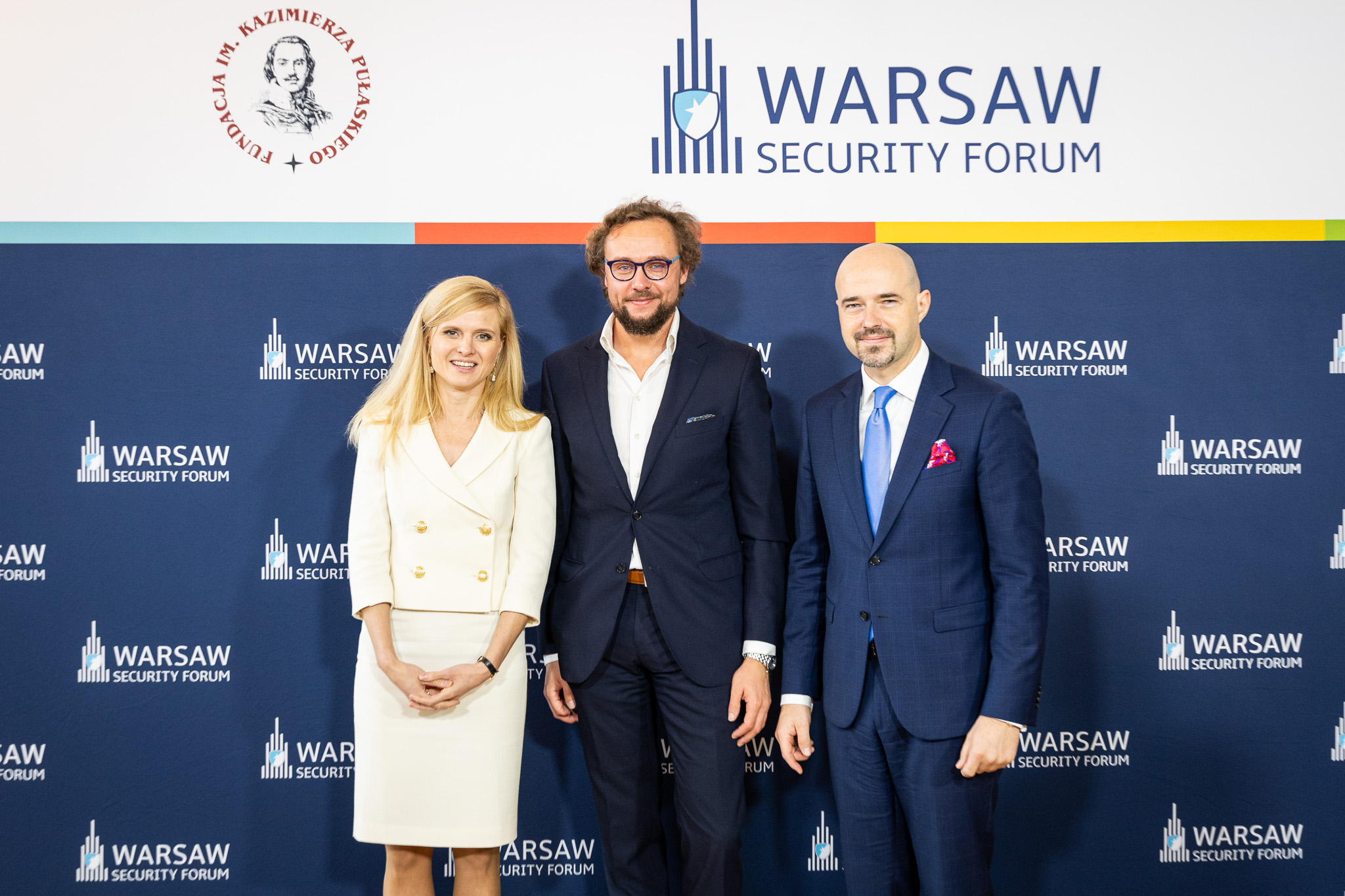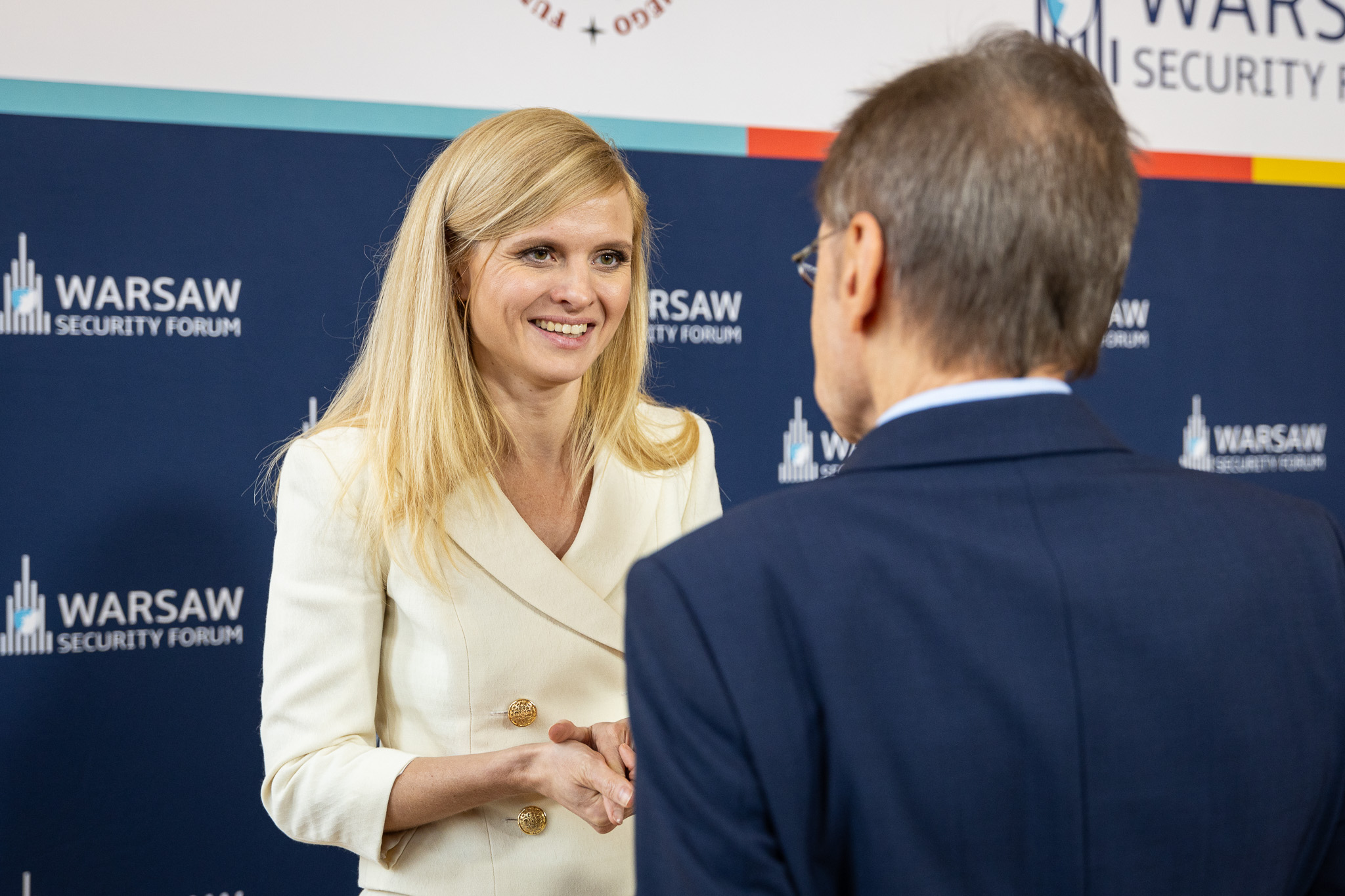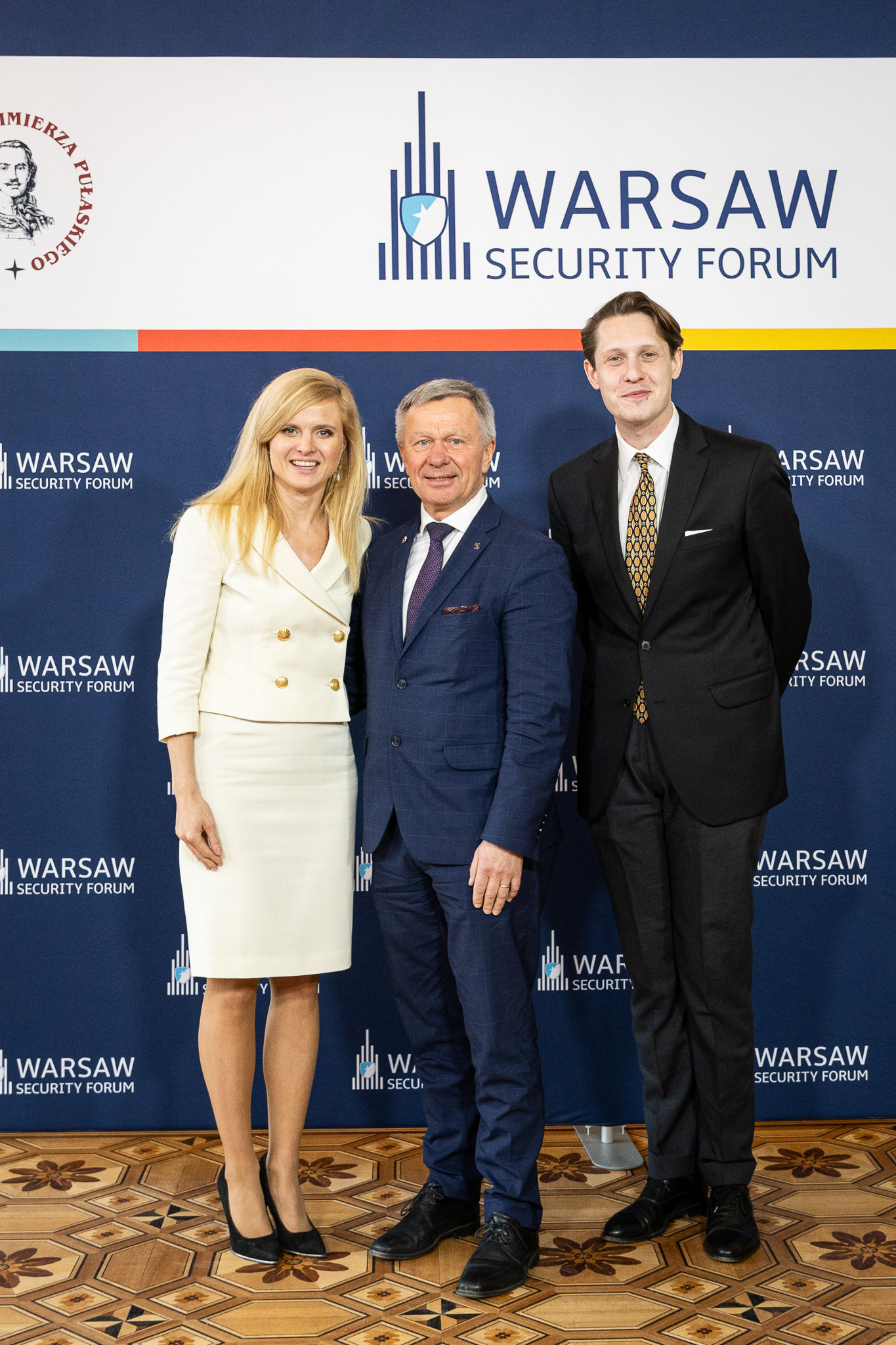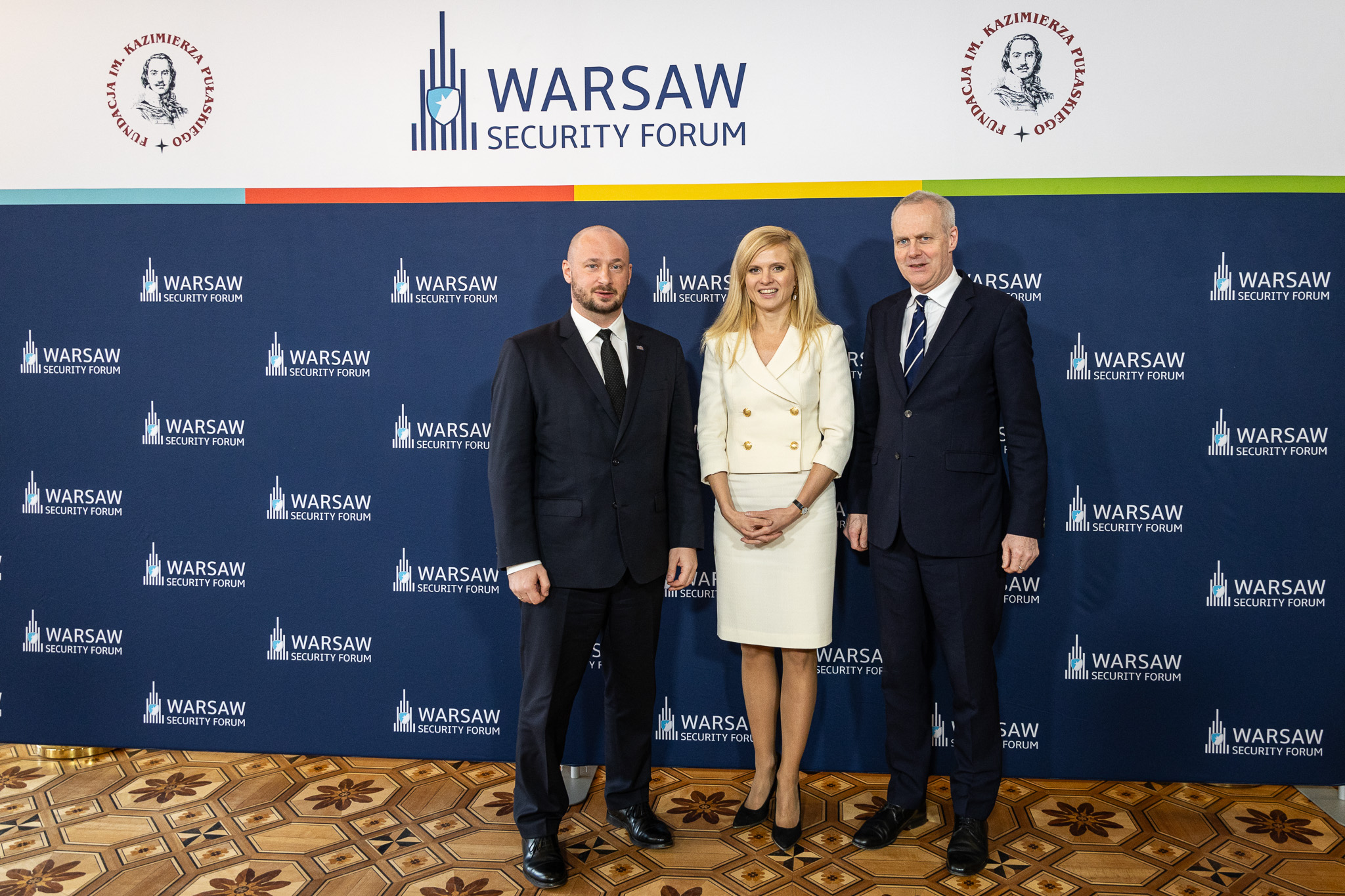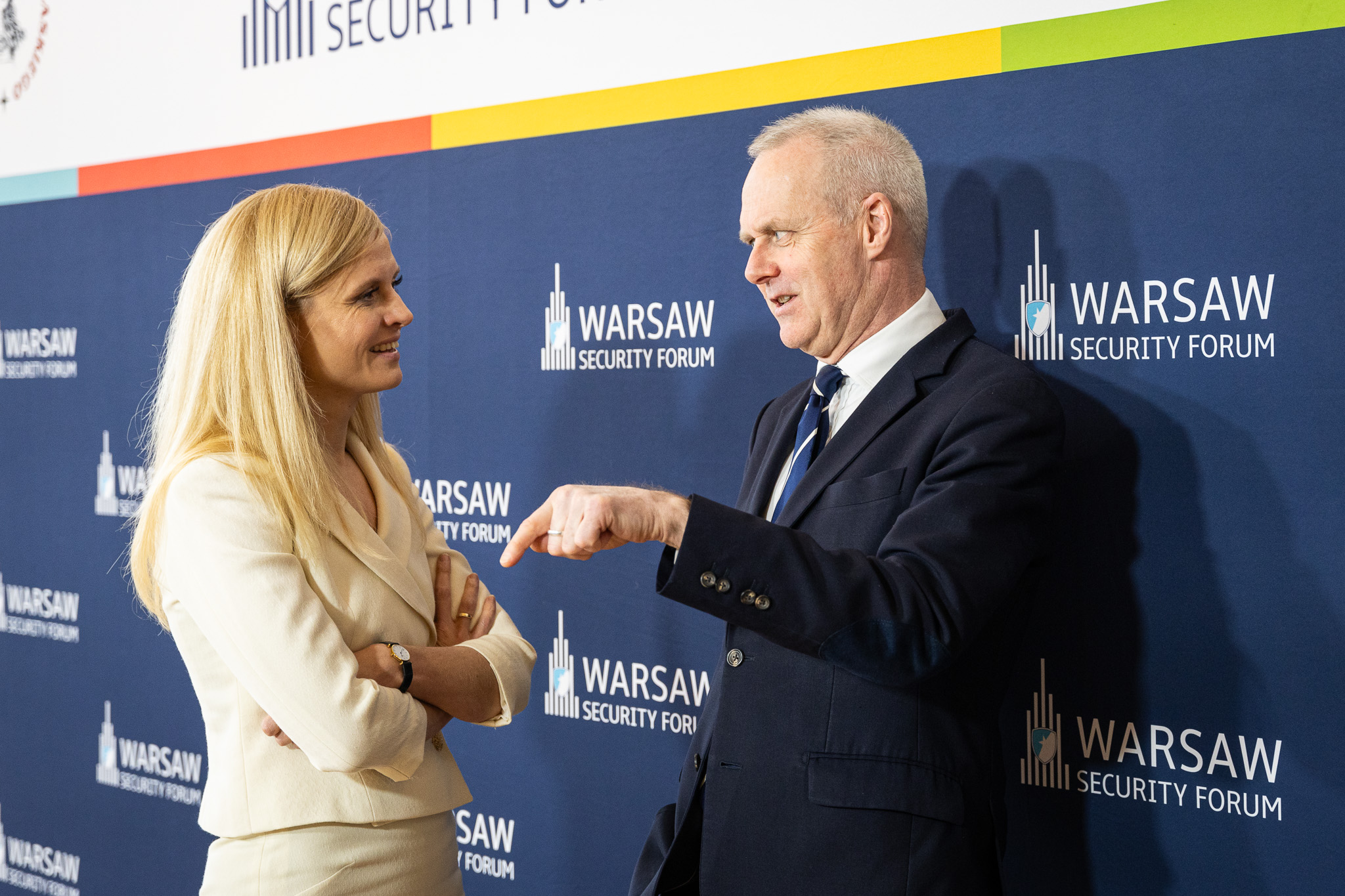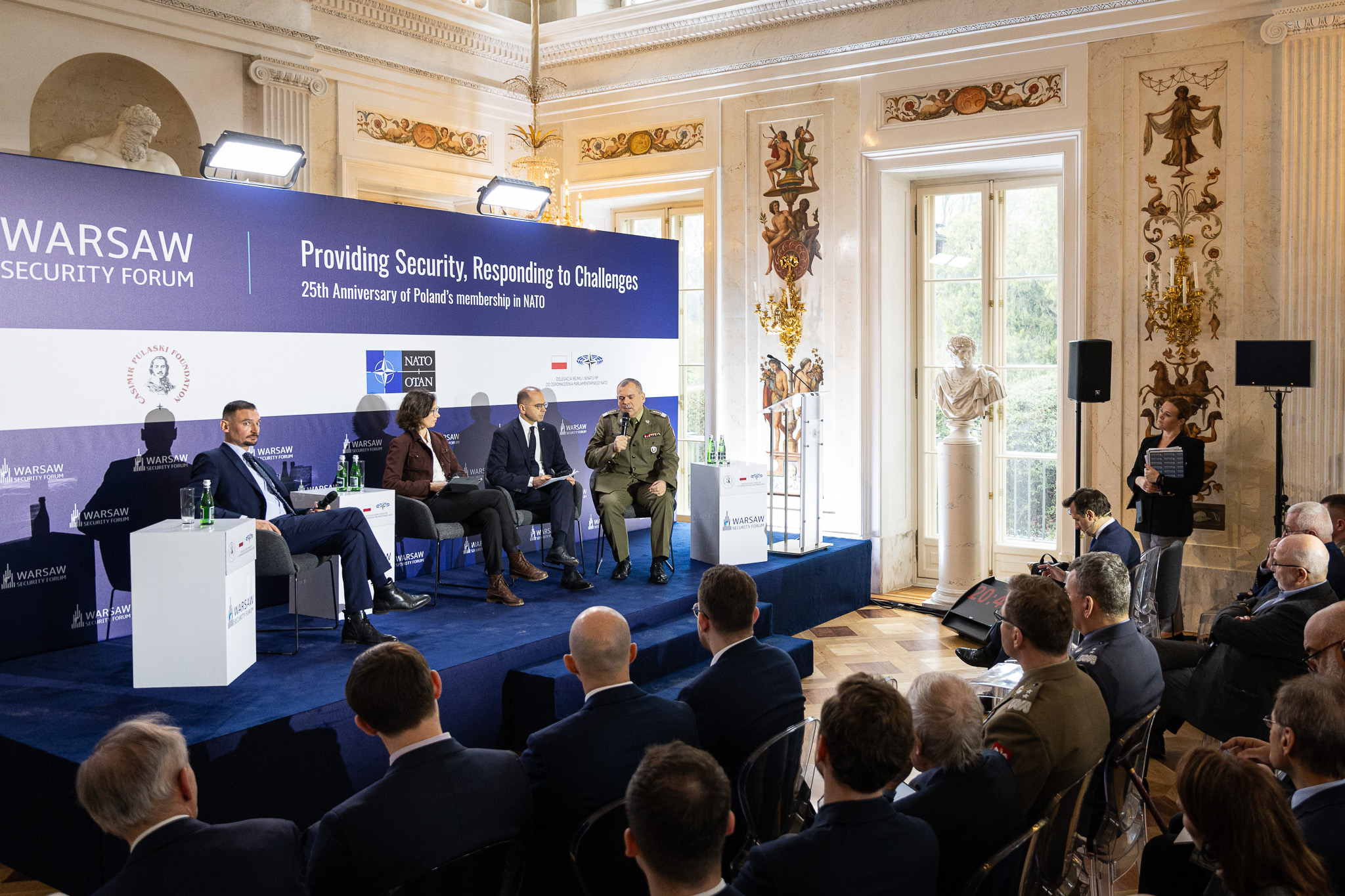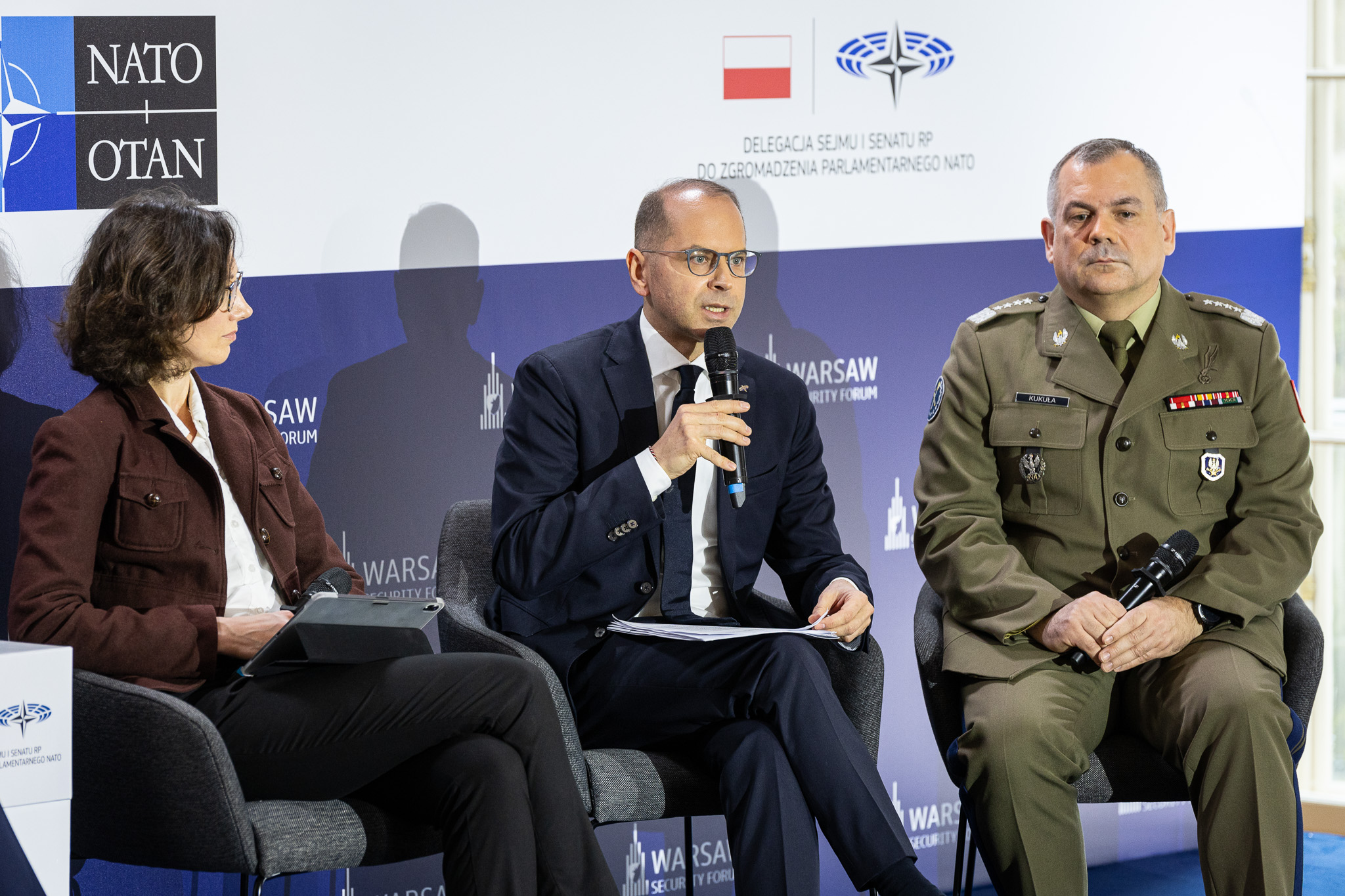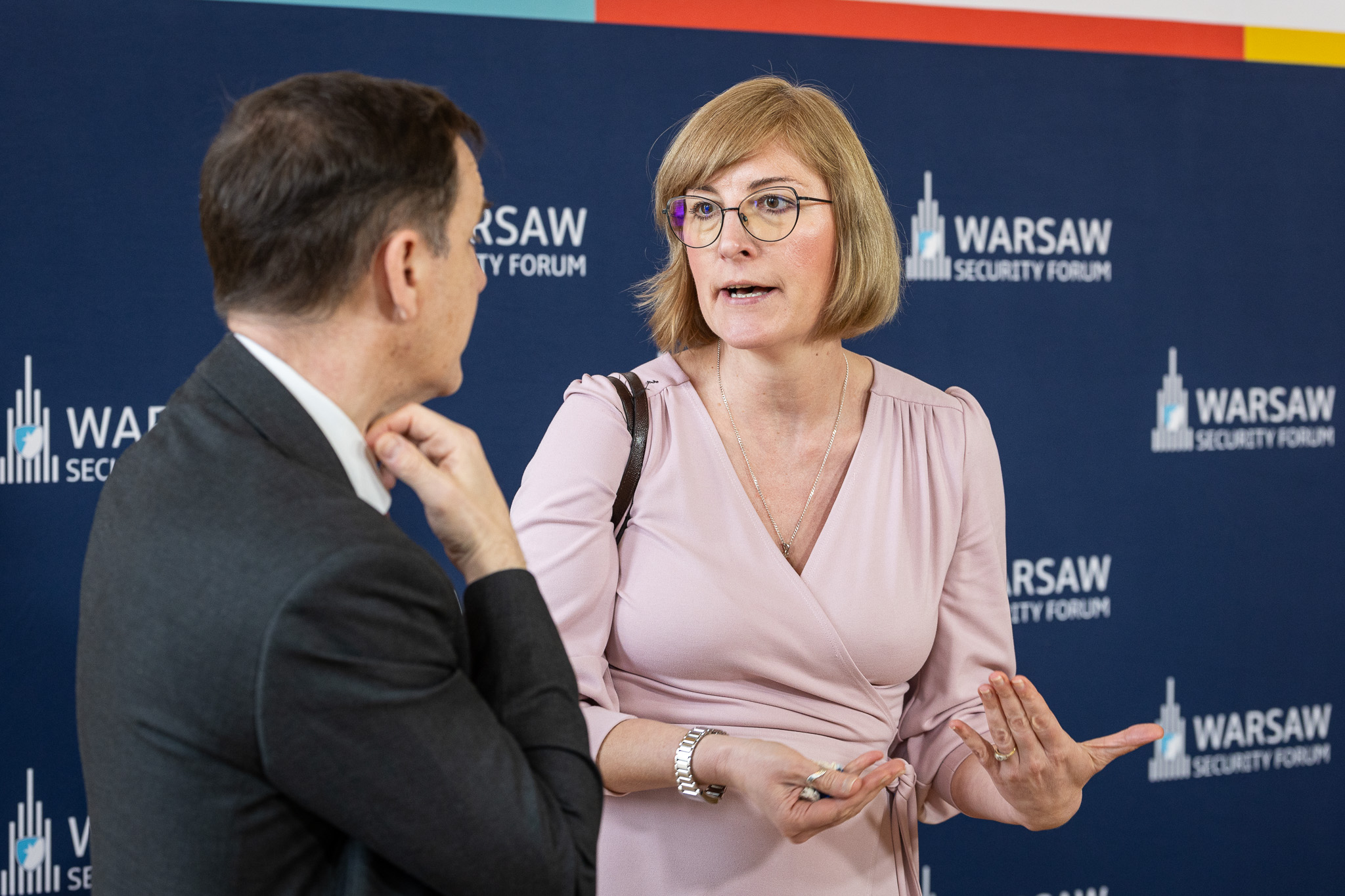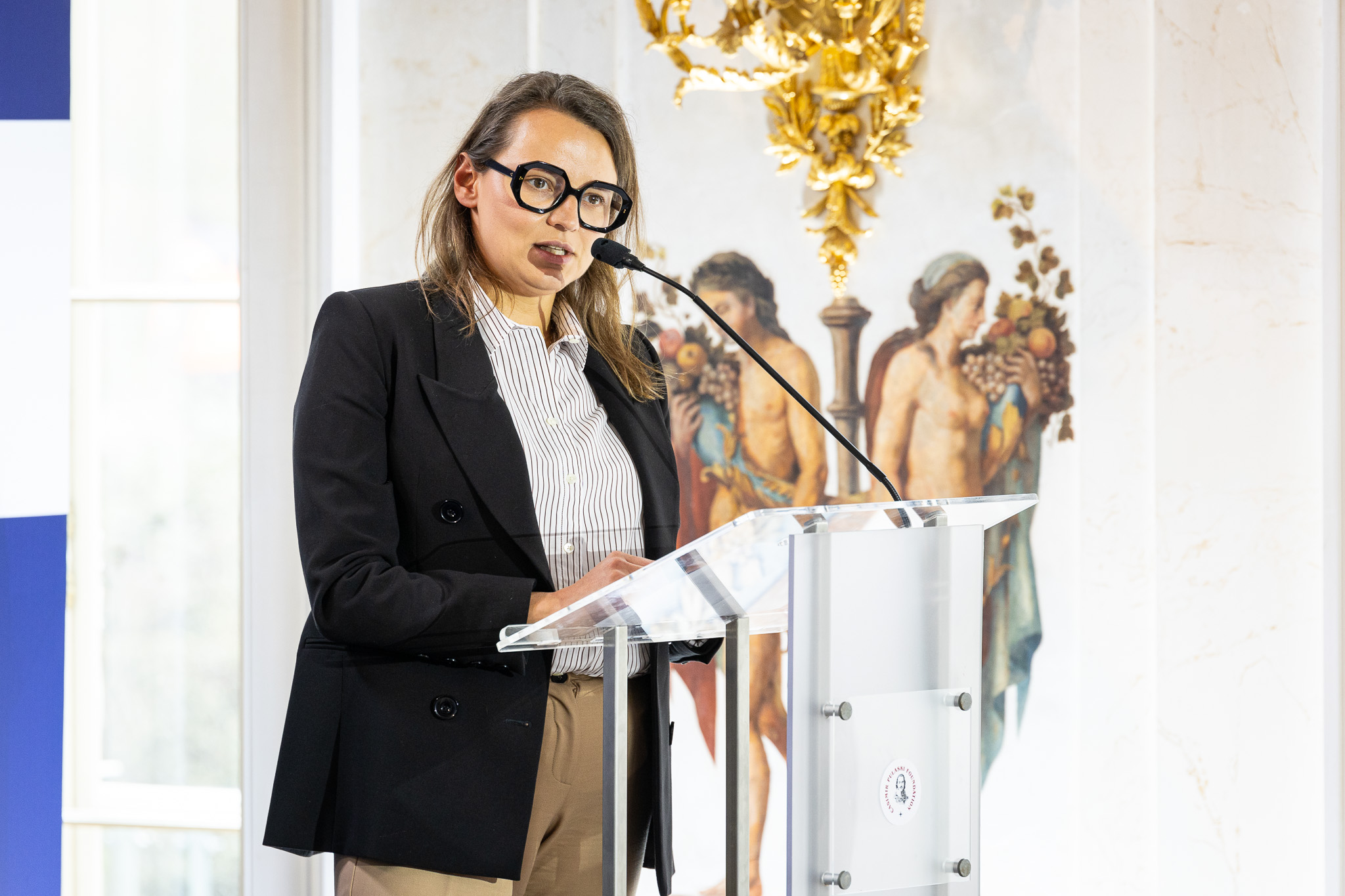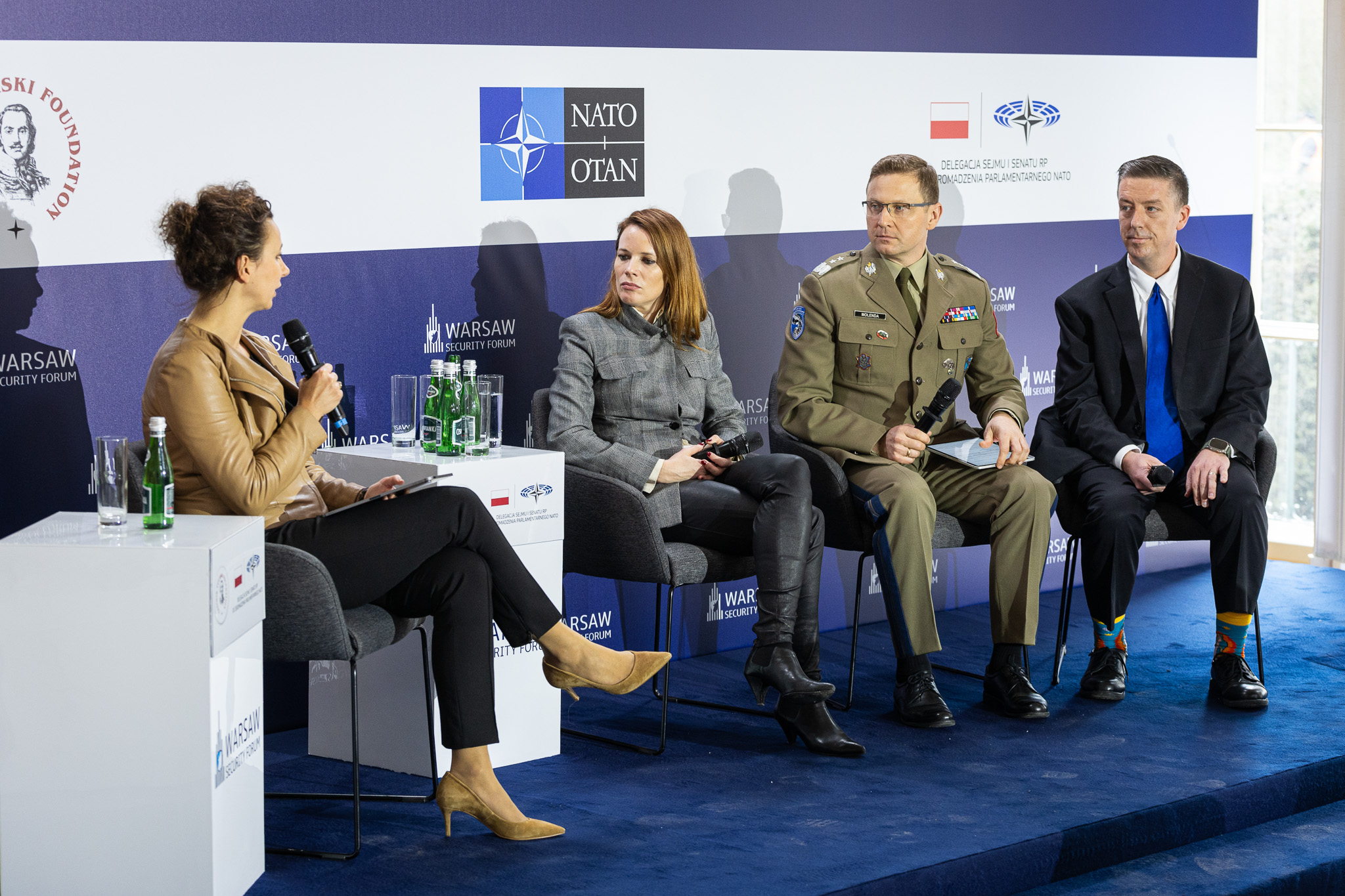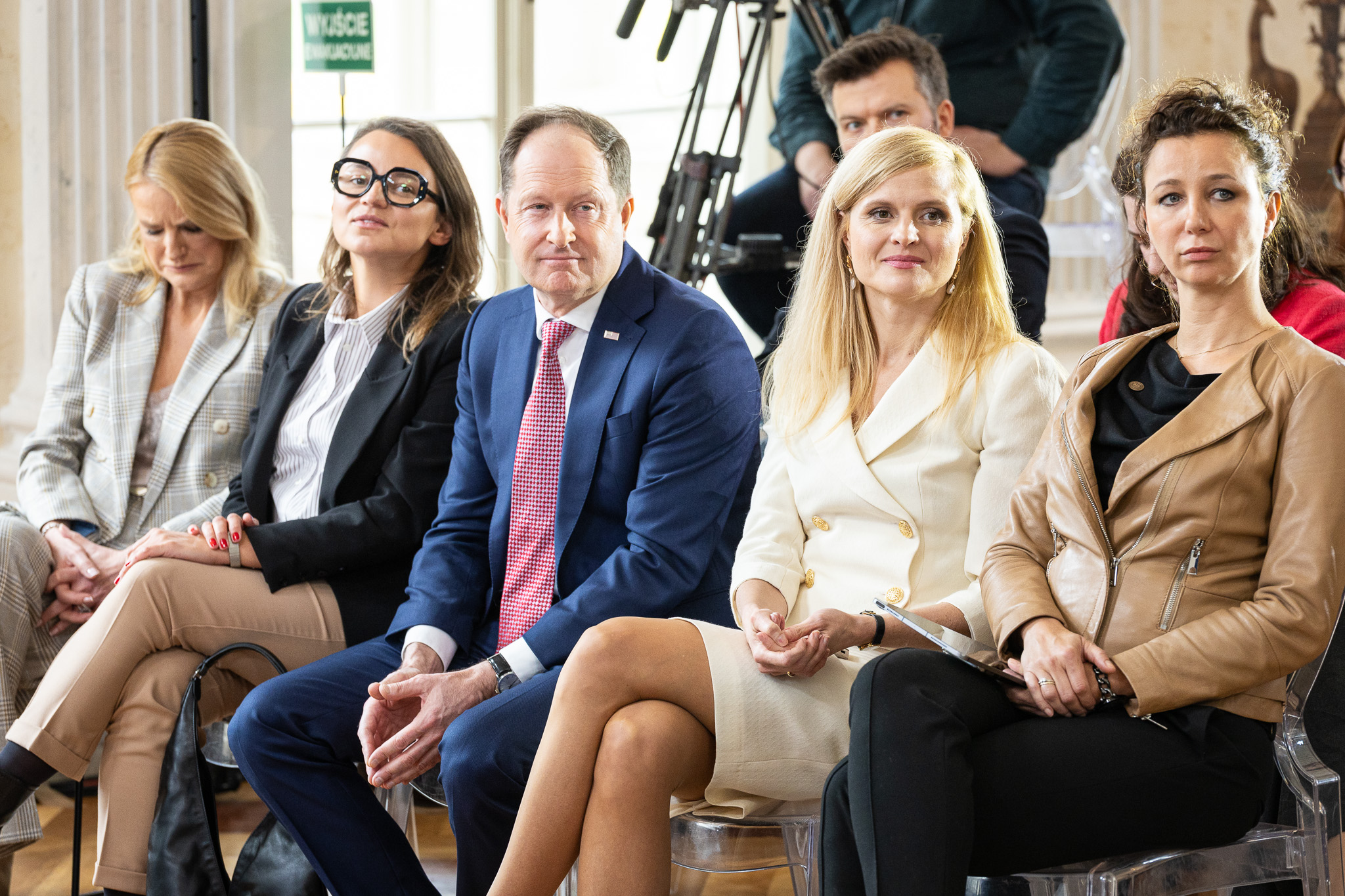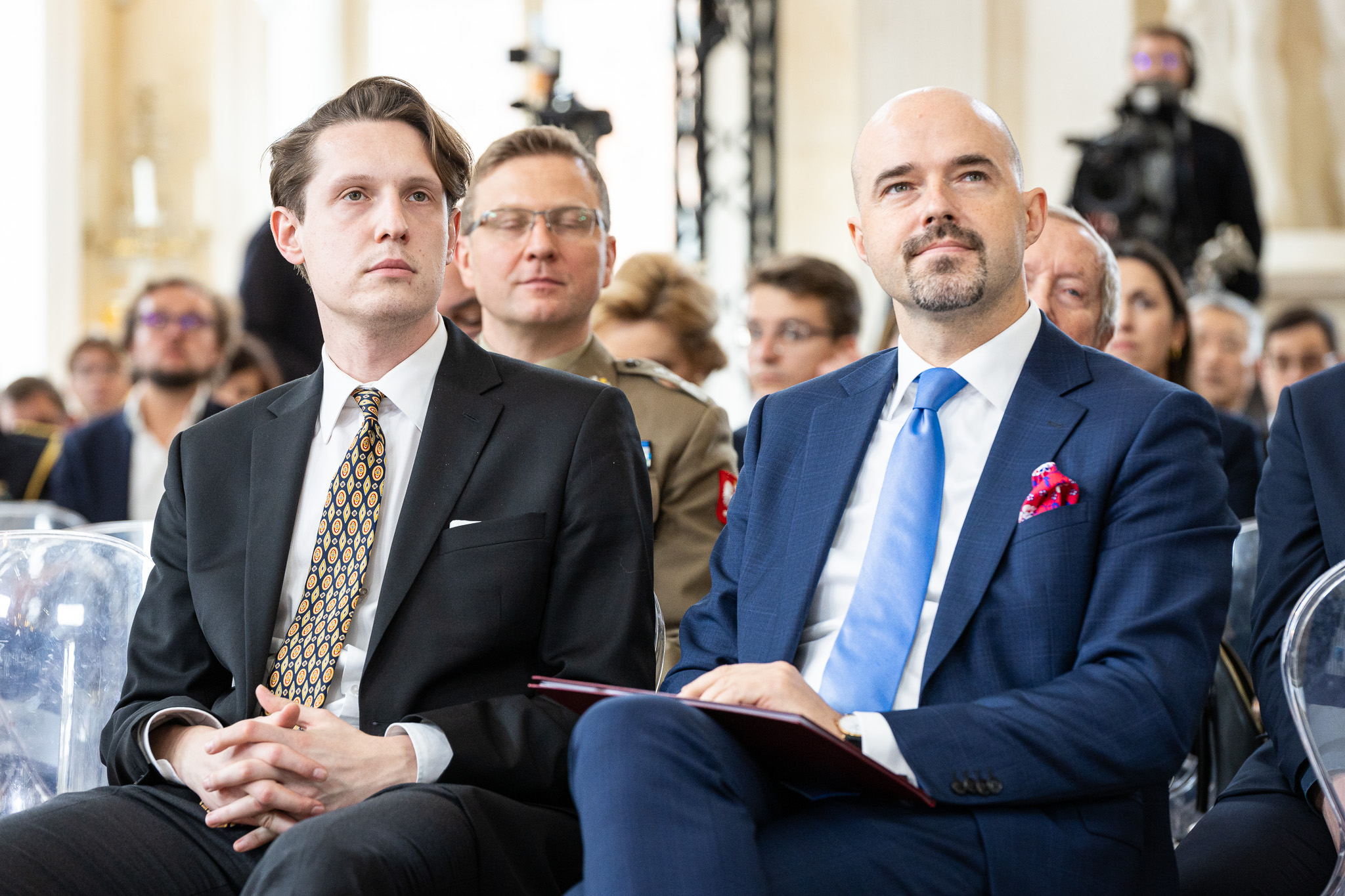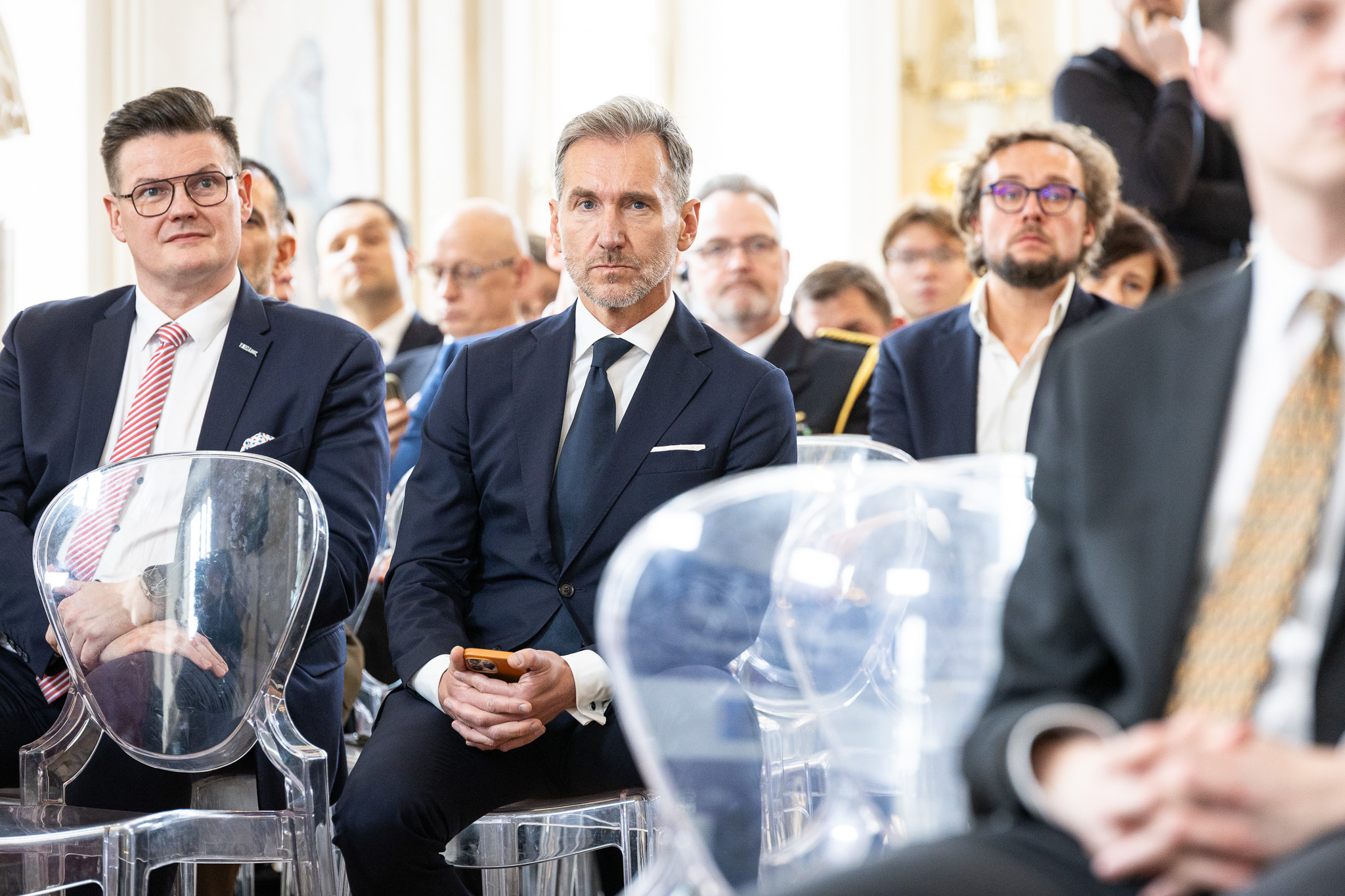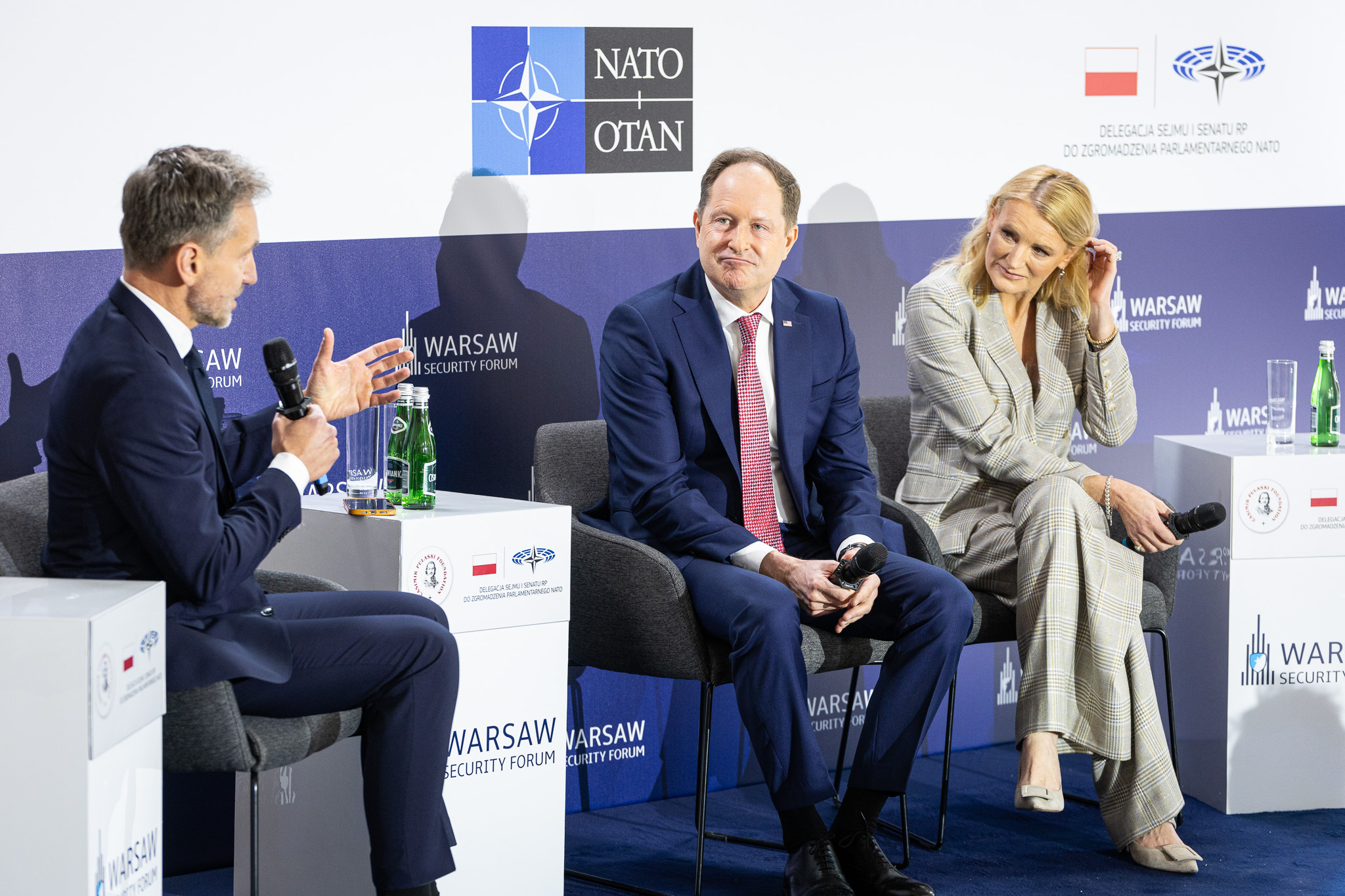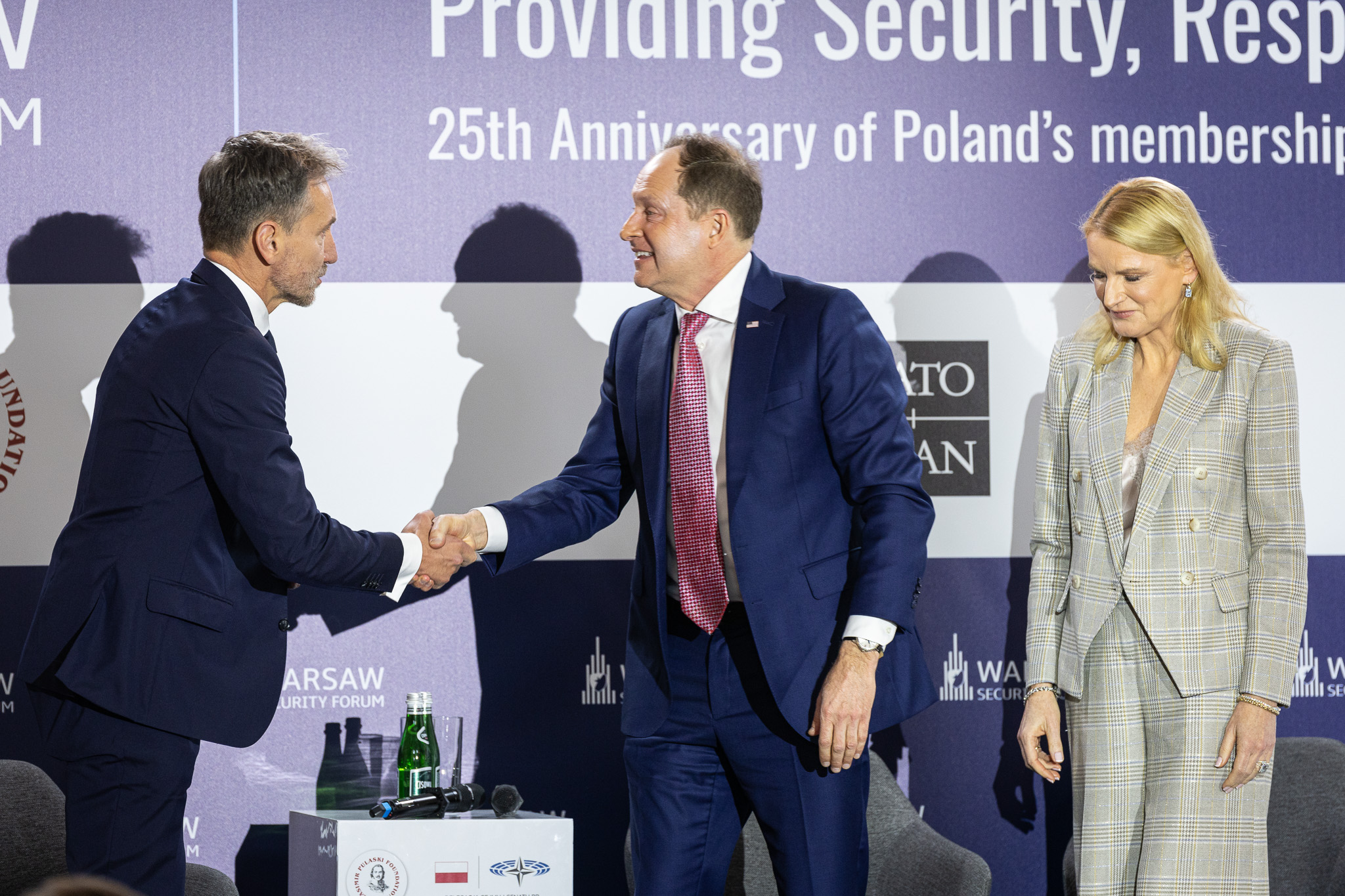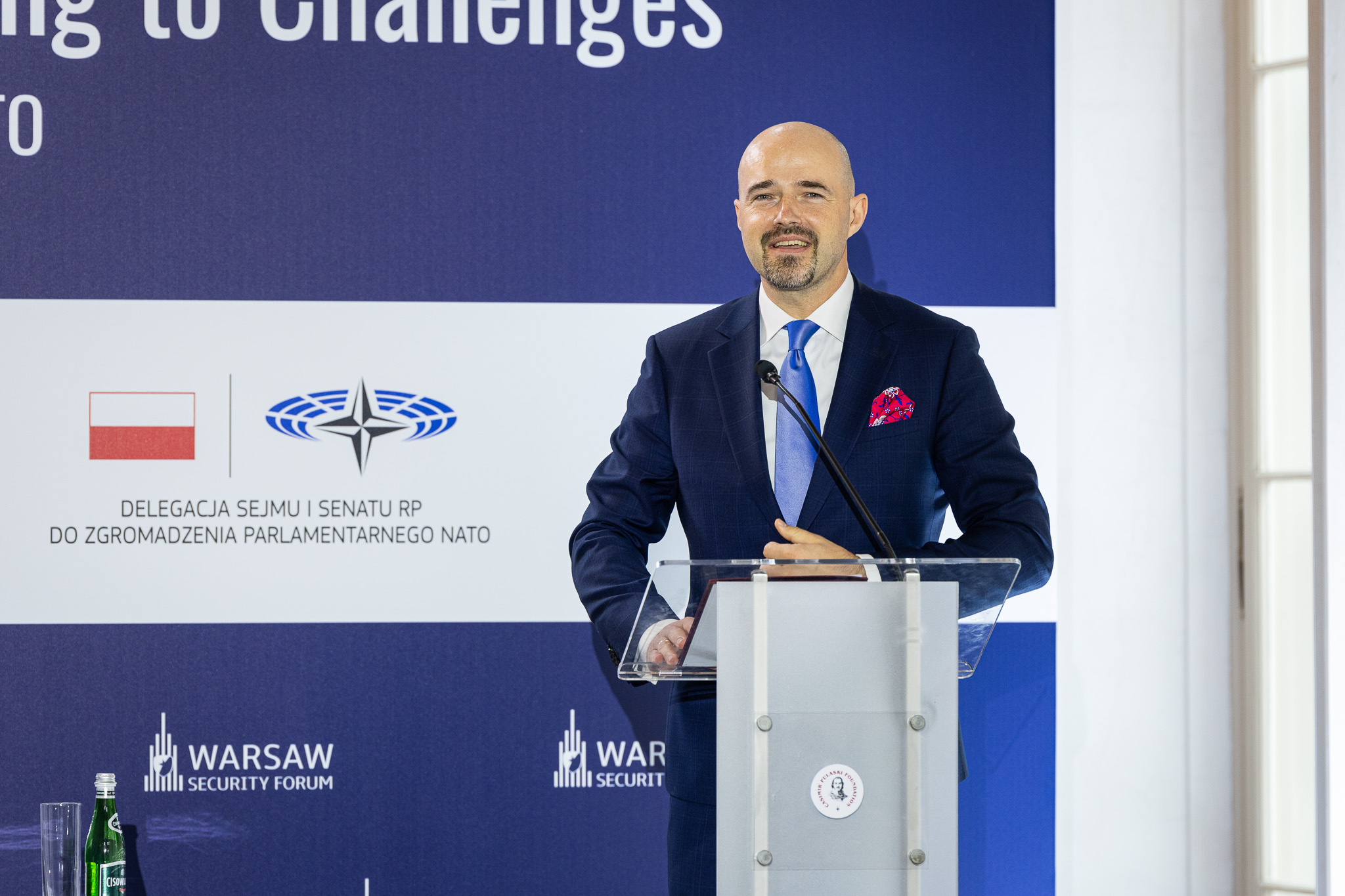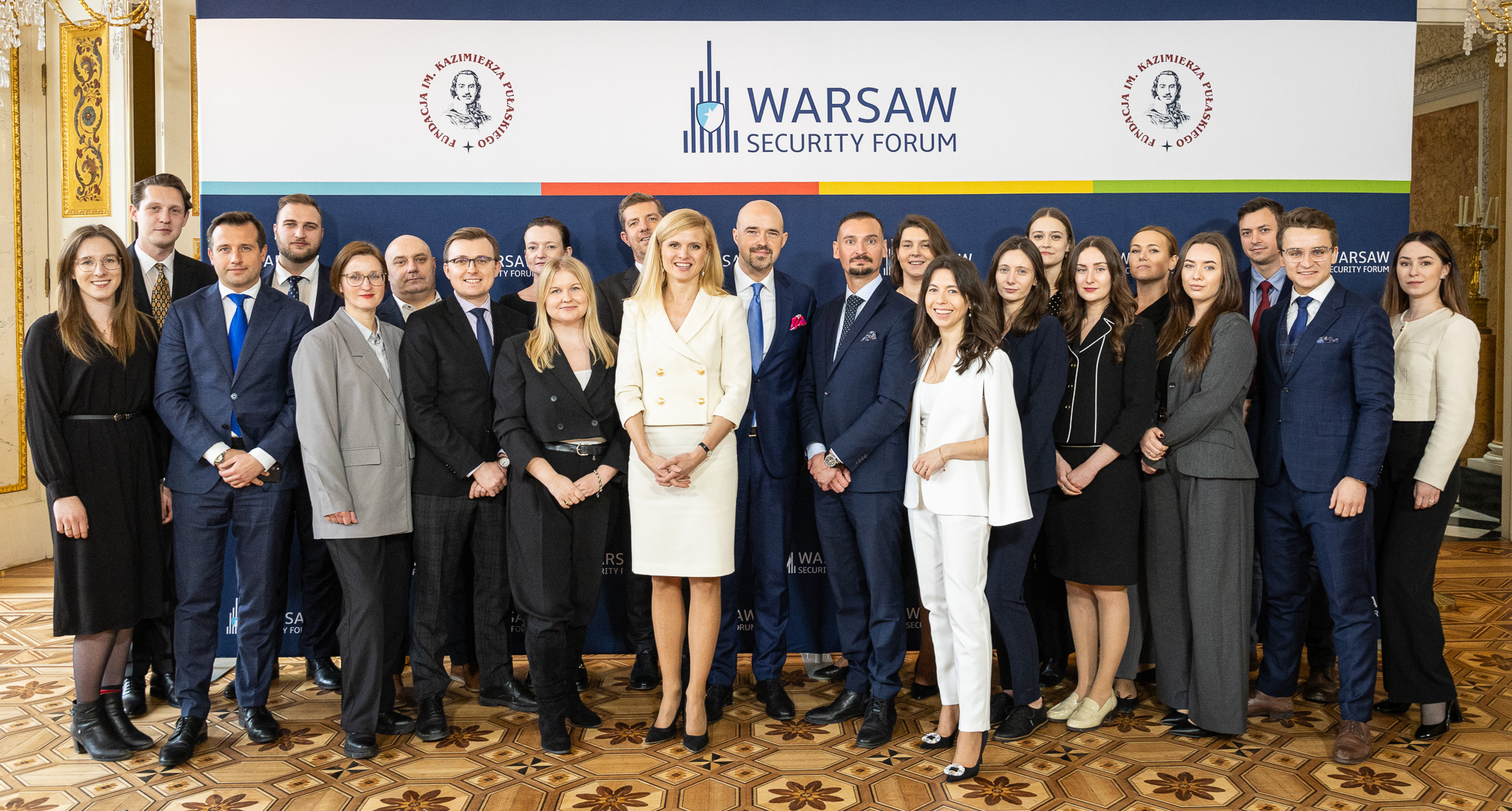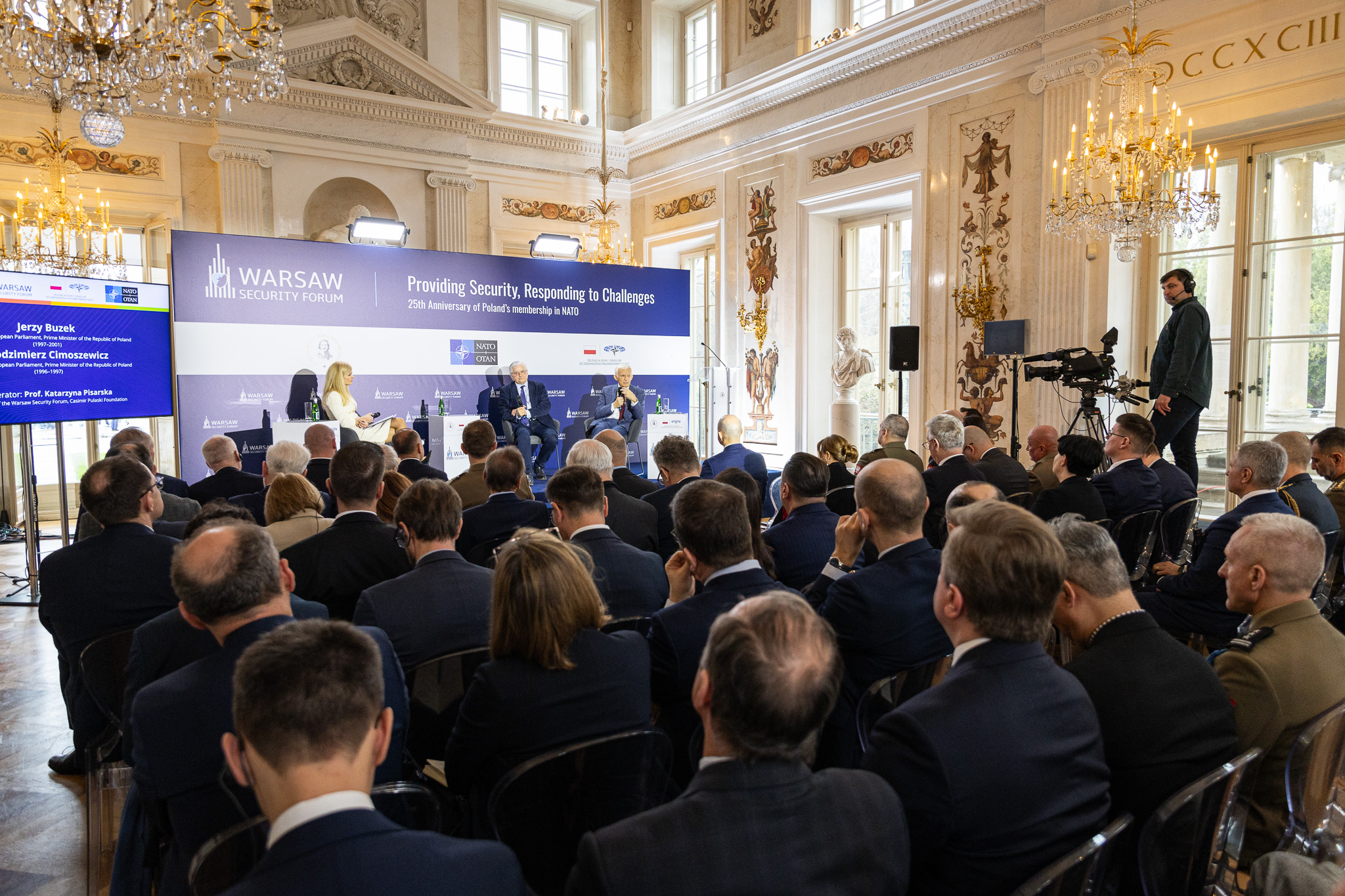
FKP_WSF_25yrs_NATO_20240318_042
Autor foto: Fundacja im. Kazimierza Pułaskiego
25th Anniversary of Poland’s membership in NATO: Conference summary
Opublikowano: March 19, 2024


FKP_WSF_25yrs_NATO_20240318_042
Autor foto: Fundacja im. Kazimierza Pułaskiego
25th Anniversary of Poland’s membership in NATO: Conference summary
Opublikowano: March 19, 2024
“Providing Security, Responding to Challenges” was the main theme of the conference hosted in Łazienki Palace on March, 18th as part of the celebration of the 25th anniversary of Poland’s accession to NATO by the Casimir Pulaski Foundation – organizer of the Warsaw Security Forum – in cooperation with President of NATO Parliamentary Assembly Michał Szczerba MP and NATO HQ.
The event welcomed the political and military leadership of Poland, which included:
- Władysław Kosiniak-Kamysz – Deputy Prime Minister and Minister of National Defence;
- Gen. Wiesław Kukuła – Chief of the General Staff of the Polish Armed Forces;
- Jacek Siewiera – Secretary of State, Head of the National Security Bureau to the President of Poland;
- Władysław T. Bartoszewski – Secretary of State, Ministry of Foreign Affairs;
- Paweł Zalewski – Secretary of State, Ministry of National Defence;
- Michał Szczerba MP – President of the NATO Parliamentary Assembly;
- Maj. Gen. Karol Molenda – Commander, Polish Cyber Command.
NATO was represented by Boris Ruge – Assistant Secretary General for Political Affairs and Security Policy, and Florence Gaub – Director of the Research Division, NATO Defense College.
As part of the commemoration of the Polish road to NATO in the 1990s, the organizers welcomed the distinguished guests who contributed to the Polish accession process: Włodzimierz Cimoszewicz – Prime Minister of Poland (1996-1997), Jerzy Buzek – Prime Minister of Poland (1997-2001), Janusz Onyszkiewicz – Minister of National Defence (1992-1993, 1997-2000), and Jerzy Koźmiński – Poland’s Ambassador to the USA (1994-2000).
During the conference, Deputy Prime Minister and Minister of National Defence, Władysław Kosiniak-Kamysz, stated that “the next 25 months will be crucial for the security of Poland and NATO”. He emphasized that the upcoming months will determine the fate of the war in Ukraine, which will also have implications for the rest of Europe. “We cannot get used to war and must be prepared for every scenario,” he emphasized.
The Minister of National Defence underlined that Ukraine’s victory depends, among other things, on further assistance from European countries.
“Ukraine’s path to NATO will be difficult. Poland has always helped other countries on their way to NATO. Investing in Ukraine’s victory is an investment in our security. Europe must increase the production capacities of the defence industry,” – Kosiniak-Kamysz pointed out.
Władysław Kosiniak-Kamysz announced that in the coming days, together with the Minister of Interior and Administration, he will present the main provisions of the Civil Defence Act. “Countries defend themselves not only with their armies alone. We must constantly stimulate societies to build awareness of threats and readiness to openly address those threats. This is a fundamental matter. In my opinion, we have had many neglects in this sphere,” he stated.
Referring to the threat emanating from Russia, Gen. Wiesław Kukuła, Chief of the General Staff of the Polish Armed Forces, speaking at the conference, warned that Moscow is preparing for a conflict with NATO. “We fully perceive the changes occurring in Russia and draw conclusions from them. Put plainly, Russia is preparing for a conflict with NATO, fully aware that the Alliance is a defensive structure,” he cautioned.
During the panel discussion “Political Consensus as the Basis of Poland’s Security Policy,” Members of the European Parliament and former Prime Ministers of Poland – Włodzimierz Cimoszewicz and Jerzy Buzek – shared their recollections about Poland joining NATO in 1999.
Cimoszewicz recalled that the dissolution of the Soviet Union was a necessary condition for achieving consensus in Polish society regarding the path to ensure Polish security through NATO membership.
“For the last 35 years, it has been the only serious project that practically did not arouse any controversy, both in the society and among the political forces. Accession to the European Union did not have such a level of support as the accession to NATO”, he noted.
Buzek warned about the ambiguous stance of Hungary about NATO and the war in Ukraine: “Today, Hungarians are acting against the Alliance. Their relationships with Russia, with Putin, are concerning.” He also highlighted that “a swift resolution of the conflict with a full victory for Ukraine would be a fundamental success for NATO.”
The conference was also a chance to look into the relationship between civil society and security, as well as the Polish relationship with Washington. US Ambassador Mark Brzezinski discussed the recent visit of President Andrzej Duda and Prime Minister Donald Tusk to the White House during the conversation entitled “Defending Every Inch of Civil Society,” in which Kasia Kieli, President & Managing Director of Warner Bros. Discovery in Poland and CEO of TVN, also participated. In particular, Brzezinski underlined that the meeting “was in line with President Biden’s vision.” He also emphasized that “the stakes in this game are very high when it comes to the war in Ukraine.”
While talking about the non-security actors, Kasia Kieli pointed out that “journalism has some role to play in every armed conflict.” She stressed that “the most important task is to inform”, and that “media play a very important role in nurturing democracy, which dies in darkness.” According to Kieli, “In times when there are so many different platforms and influencers, the demand for credible information is constantly growing and is of a critical nature.”
The conference “Providing Security, Responding to Challenges” was a part of the Casimir Pulaski Foundation’s efforts to sustain the quality debate about security and defence in Poland, in a bipartisan setting and in the presence of various actors that include civil society, experts, policymakers, and the leadership of the Polish Armed Forces.
“Providing Security, Responding to Challenges” was the main theme of the conference hosted in Łazienki Palace on March, 18th as part of the celebration of the 25th anniversary of Poland’s accession to NATO by the Casimir Pulaski Foundation – organizer of the Warsaw Security Forum – in cooperation with President of NATO Parliamentary Assembly Michał Szczerba MP and NATO HQ.
The event welcomed the political and military leadership of Poland, which included:
- Władysław Kosiniak-Kamysz – Deputy Prime Minister and Minister of National Defence;
- Gen. Wiesław Kukuła – Chief of the General Staff of the Polish Armed Forces;
- Jacek Siewiera – Secretary of State, Head of the National Security Bureau to the President of Poland;
- Władysław T. Bartoszewski – Secretary of State, Ministry of Foreign Affairs;
- Paweł Zalewski – Secretary of State, Ministry of National Defence;
- Michał Szczerba MP – President of the NATO Parliamentary Assembly;
- Maj. Gen. Karol Molenda – Commander, Polish Cyber Command.
NATO was represented by Boris Ruge – Assistant Secretary General for Political Affairs and Security Policy, and Florence Gaub – Director of the Research Division, NATO Defense College.
As part of the commemoration of the Polish road to NATO in the 1990s, the organizers welcomed the distinguished guests who contributed to the Polish accession process: Włodzimierz Cimoszewicz – Prime Minister of Poland (1996-1997), Jerzy Buzek – Prime Minister of Poland (1997-2001), Janusz Onyszkiewicz – Minister of National Defence (1992-1993, 1997-2000), and Jerzy Koźmiński – Poland’s Ambassador to the USA (1994-2000).
During the conference, Deputy Prime Minister and Minister of National Defence, Władysław Kosiniak-Kamysz, stated that “the next 25 months will be crucial for the security of Poland and NATO”. He emphasized that the upcoming months will determine the fate of the war in Ukraine, which will also have implications for the rest of Europe. “We cannot get used to war and must be prepared for every scenario,” he emphasized.
The Minister of National Defence underlined that Ukraine’s victory depends, among other things, on further assistance from European countries.
“Ukraine’s path to NATO will be difficult. Poland has always helped other countries on their way to NATO. Investing in Ukraine’s victory is an investment in our security. Europe must increase the production capacities of the defence industry,” – Kosiniak-Kamysz pointed out.
Władysław Kosiniak-Kamysz announced that in the coming days, together with the Minister of Interior and Administration, he will present the main provisions of the Civil Defence Act. “Countries defend themselves not only with their armies alone. We must constantly stimulate societies to build awareness of threats and readiness to openly address those threats. This is a fundamental matter. In my opinion, we have had many neglects in this sphere,” he stated.
Referring to the threat emanating from Russia, Gen. Wiesław Kukuła, Chief of the General Staff of the Polish Armed Forces, speaking at the conference, warned that Moscow is preparing for a conflict with NATO. “We fully perceive the changes occurring in Russia and draw conclusions from them. Put plainly, Russia is preparing for a conflict with NATO, fully aware that the Alliance is a defensive structure,” he cautioned.
During the panel discussion “Political Consensus as the Basis of Poland’s Security Policy,” Members of the European Parliament and former Prime Ministers of Poland – Włodzimierz Cimoszewicz and Jerzy Buzek – shared their recollections about Poland joining NATO in 1999.
Cimoszewicz recalled that the dissolution of the Soviet Union was a necessary condition for achieving consensus in Polish society regarding the path to ensure Polish security through NATO membership.
“For the last 35 years, it has been the only serious project that practically did not arouse any controversy, both in the society and among the political forces. Accession to the European Union did not have such a level of support as the accession to NATO”, he noted.
Buzek warned about the ambiguous stance of Hungary about NATO and the war in Ukraine: “Today, Hungarians are acting against the Alliance. Their relationships with Russia, with Putin, are concerning.” He also highlighted that “a swift resolution of the conflict with a full victory for Ukraine would be a fundamental success for NATO.”
The conference was also a chance to look into the relationship between civil society and security, as well as the Polish relationship with Washington. US Ambassador Mark Brzezinski discussed the recent visit of President Andrzej Duda and Prime Minister Donald Tusk to the White House during the conversation entitled “Defending Every Inch of Civil Society,” in which Kasia Kieli, President & Managing Director of Warner Bros. Discovery in Poland and CEO of TVN, also participated. In particular, Brzezinski underlined that the meeting “was in line with President Biden’s vision.” He also emphasized that “the stakes in this game are very high when it comes to the war in Ukraine.”
While talking about the non-security actors, Kasia Kieli pointed out that “journalism has some role to play in every armed conflict.” She stressed that “the most important task is to inform”, and that “media play a very important role in nurturing democracy, which dies in darkness.” According to Kieli, “In times when there are so many different platforms and influencers, the demand for credible information is constantly growing and is of a critical nature.”
The conference “Providing Security, Responding to Challenges” was a part of the Casimir Pulaski Foundation’s efforts to sustain the quality debate about security and defence in Poland, in a bipartisan setting and in the presence of various actors that include civil society, experts, policymakers, and the leadership of the Polish Armed Forces.

